

All About Having a Baby in Mexico (Birth Tourism)
August 20, 2023 darcy comments 1 comment.
When I was growing up, people born outside the US to American parents were almost always in the military, stationed overseas. These days, it’s becoming more popular to have a baby in Mexico as a means of giving your child dual citizenship and more opportunities.
Having been there, done that, and gotten the maternity t-shirt, I figured that maybe my experience can help someone choose to do – or avoid! – the same.
I’ll be honest, it felt like most US citizens that give birth in Mexico speak Spanish better that us, or have a spouse who is from Mexico. I did kind of wonder if we were crazy, making a short term move to Mexico to have a baby.
Keep reading to get an overview of our experience, or click below to the detailed posts: Our Experience with Birth in Mexico The Acta de Nacimiento (Mexican birth certificate) The CRBA and US Passport The Mexican Passport Mexican Residency – we are entitled to Mexican residency, but have not yet applied
The idea to give birth in Mexico, or birth tourism, has become more popular. There are now many agencies that facilitate every step of the process for you – if you pay them a handsome fee. That’s not our style, and it’s certainly not necessary. However, if money isn’t a factor in your choice, hiring a birth agency may be a great option.
Why We Decided to Have a Baby in Mexico
The main reason to give birth in Mexico is financial. I gave birth to our first child in the USA, and even with insurance the cost was about $12,000. That’s the price we pay for being contract employees (aka self-employed) whose only insurance option is healthcare marketplace. My understanding is that a subsequent administration gutted the “affordable” out of the Affordable Care Act. These days, it’s poor coverage and high prices.
The cost of having a baby in Mexico was just under $5000, in a private hospital with no insurance. If you include the rent that we paid for the four months we were there, the total cost is still cheaper than our US experience at $10,500. And obviously our rent was not cheap.
In addition to the immediate financial benefits, the nice thing about a Mexican passport is travel visa-free to many countries. He can visit places like South America without paying “reciprocal fees.” Essentially, the US made it so expensive for some travelers to visit, that those countries started making US tourist visas equally expensive. Traveling in on a Mexican passport would be significant cheaper.
With a Mexican “anchor baby,” the parents and siblings can apply for permanent residency, aka a green card.
And finally, who wouldn’t want to spend the final months of pregnancy basking in the sun on a Mexican beach?
How We Got Started
We’d read about a couple other travelers who had a baby in Mexico and that’s what sparked the idea. When we decided to actually commit to planning, our priority was finding a good doctor. There’s a lot of myths about Mexico that may scare people off, but there is one very real concern: unnecessary c-sections. Worldwide, the c-section rate is about 20%. In the USA it’s around 30%. Mexico clocks in at a whopping 45%. A c-section is a wonderful option when it is medically necessary, but I absolutely cannot imagine recovering from surgery with a toddler and a newborn – especially if it’s avoidable.
We found a doctor who only performs c-sections when needed, and she speaks good English. So that gave us a location to target. Then we found an airbnb in Puerto Vallarta, got in contact with the owners. We asked if they’d offer us a cheaper rate for our longer term stay. They offered us a lease so we could avoid the astronomical airbnb fees and taxes. It was still 50% higher than any rent we’ve ever paid, but it was short notice and a great location. It even had a pool!
We booked flights. Dream became reality.
Prenatal Care in Mexico
We arrived in Mexico right around the start of my third trimester. Appointment scheduling was almost exactly the same as the US. Monthly appointments for most of the pregnancy, then towards the end every 2 weeks, and then weekly until birth. I had no local health insurance, I paid 900 pesos per visit ($50). Each visit included an ultrasound, and towards the end they also did a non-stress test.
We decided on an elective induction so that we could ensure childcare for our toddler, one of the few downsides to giving birth so far from home. It was an extremely gentle induction, so gentle that it felt more like waiting for natural labor. As things ramped up, my doctora even came to our apartment to check how I was progressing (she made sure we knew that house calls were not standard, but she lived just a few blocks from us).
When she gave the word, we all headed to the hospital. It was also right in our neighborhood, only 1km away.
Total cost of 6 OB appointments, labwork, a special ultrasound, and prescriptions: $555.82
Birth in a Private Hospital in Puerto Vallarta
I won’t get too graphic here, but the birth happened quickly. Both the doctora and the hospital said they’d never had anything like that happen before. So, while I was very excited to get an epidural, I had the baby before the anesthesiologist even arrived at the hospital. My experience with the hospital was absolutely on par with the US. One difference is that the nurses didn’t really interact much, leaving that to the doctors. However, that could have been because of the language barrier. At the hospital, most of the doctors spoke good English and most of the nurses did not. Puerto Vallarta is a big tourist town, including medical tourism, and many locals speak good English.
After the initial pediatrician check, baby Arrow never left my side. As is common in Mexico for a birth with no complications, we left the hospital in less than 24 hours after giving birth.
Cost of OB delivery: $2490.74 Cost of private hospital: $1501.88

Differences in Newborn Care in Mexico
Here is where my healthcare experience in the US really diverged from my experience in Mexico. In the US, the metabolic test and hearing test were done right at the hospital when I gave birth. They also took care of getting the birth certificate and the social security number. They also performed the first vaccine right there at birth. Then we had to schedule the first pediatrician appointment for 3 days after birth.
In Mexico, these were all separate appointments and errands that we had to run. We needed to get the vaccine at Centro de Salud within the first 7 days of life, and the metabolic test at a lab within the first two months, and the hearing test at a clinic within the first 3 months. The hospital gave us a hospital birth form, and we needed to take that and other documentation to the Registro Civil (civil registry) to get the Acta de Nacimiento (birth certificate) and CURP (Mexican version of a social security number). The first pediatrician appointment was 10 days after birth, as was my postpartum OB visit.
For parents with a toddler and a newborn, it was A LOT. Mexicans observe “cuarentena,” where a mother stays home to recover and bond with her newborn for the first 40 days. I don’t understand how I was supposed to get half a dozen postpartum appointments accomplished without leaving the house. Every day we were trying to get something else done. It took us three trips to Registro Civil to get the Acta, and two trips to the blood lab to get the metabolic test. It was exhausting.
Vaccinations
In Mexico, vaccinations are a child’s right. We had our first experience with Centro de Salud when our toddler needed his next round of vaccinations. I walked in with the kid, he got his shots, and we walked right back out. Not only did they not ask for money, they hardly even asked for proof of his age or what shots were necessary (hopefully this is related to me being a foreigner and also the language barrier, and not their standard).
With the newborn, it was the same thing. I walked in, he got his shots, we walked out. It was so great that I specifically planned our departure from Mexico around the 2-month vaccines. I wasn’t leaving without them! We were flying into a US state where we didn’t have health insurance, making easy, free vaccines in Mexico superior to figuring out where to get them done in the USA.
Documenting Our New Baby
So, as I just said, it took us three trips to Registro Civil to get our Acta de Nacimiento . The Acta is critically important because it is the piece of paperwork we needed before we could start the process of documenting our child as a US citizen, which had to be done before we could go back to the States.
Once we had the Acta, we submitted the application for a Consular Report of Birth Abroad. The CRBA functions as a US birth certificate for citizens born abroad. It was our understanding that we could go to the consular office in Puerto Vallarta for our CRBA. It seems that Covid changed that process. Instead, our family of four had to fly to Guadalajara to the consulate. But first we had to secure an appointment!
The consulate told us it could take up to four months to hear back about scheduling an appointment. Another person who’d recently been through this said that it took four months to get their appointment at the consulate, but then the consulate gave them 5 days notice for their appointment. If they were not able to make it to their appointment, the process would have started all over again. We only had our apartment leased for two more months, so between this and the news that we had to fly with our newborn and toddler, we were thoroughly stressed out.
Instead, we specified that we had extenuating circumstances and needed an emergency appointment. We had upcoming travel plans, and had no lodging past that date. Within 5 days of submitting our application, we had an appointment scheduled for 3 weeks later. We had to fly to the consulate with extensive documentation for both us and the baby, but at our appointment we were approved for the CRBA, and we were able to get an emergency passport printed within an hour of being granted citizenship.
As soon as we had the Acta, we also scheduled an appointment for a Mexican passport. We did not need this in order to return to the USA, but it was my understanding that it was a quick and easy thing to acquire. That was a big fat lie. It took 6 trips to the SRE, every time they told us “Oh, we just need one change to the paperwork, and then you’re all set!” And every time, they would find something else that was wrong. We finally received the Mexican passport 4 days before we flew back to the USA.
Lastly, once we were back in the US, we had to visit a Social Security Administration office to complete our application for a social security number. It took a single visit and was no trouble at all.

Other Resources for Having a Baby in Mexico
Rebel Heart – A couple that, like us, had a baby in the USA then later had a baby in Puerto Vallarta, Mexico. They had to nuke their blog after internet trolls targeted them, but their helpful pages about birth in Mexico have been preserved by archive.org. Charlotte documented her experience pretty extensively, she shares some great tips for having a baby in Mexico. Some of the information is outdated, Registro Civil is in a different building, and the consular office is no longer processing CRBAs.
Anna Everywhere – Another woman who extensively wrote about her experience giving birth in Cancun. She is the only one I’ve seen write about the process for getting permanent residency in Mexico after having a baby there.
Foxflat – A woman who blogged about having a baby in Mexico City. Katie mainly talks about the medical side of the experience, but doesn’t talk about the bureaucracy too much. She hired a lawyer to get the Mexican birth certificate for them, and I’m very jealous that she had that option.
LuxPats – A couple who intended to blog about the whole paperwork process for documenting their anchor baby in Mexico, but only made it as far as the Acta de Nacimiento (I suspect they, like us, have some PTSD about the experience – paperwork trauma). It took them 9 weeks to get the baby’s Mexican birth certificate!
Facebook – For better or for worse, no one really blogs anymore. Instead, the information is shared via Facebook, which means it’s not readily available via internet search. I joined the Puerto Vallarta Facebook group and gleaned some information there, and I also made a couple contacts that answered a lot of my questions. Many thanks to the kind strangers who wrote paragraphs and paragraphs of information to help ease our stress levels.
One thought on “ All About Having a Baby in Mexico (Birth Tourism) ”
Wow! Great write up! You had me on edge of my seat! Beautiful pictures!
Tell us what you think! Cancel reply

Give birth in Mexico
Can you imagine giving birth in paradise, your child gets two citizenships.
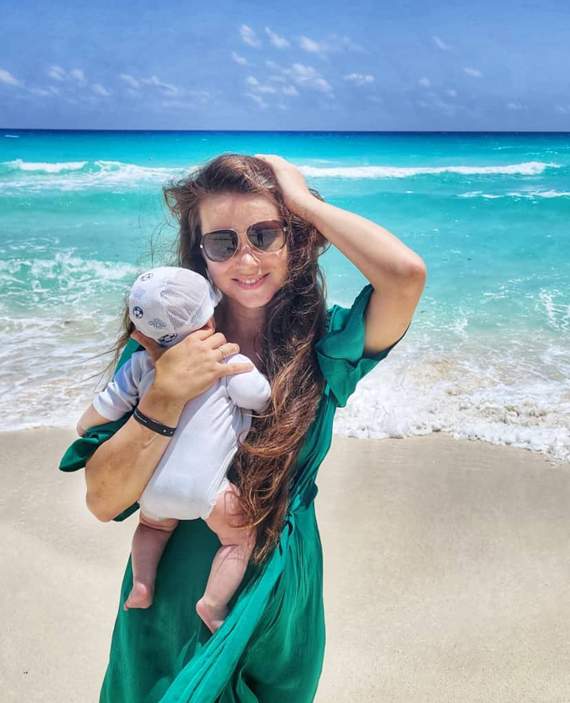
NUMBER 1 CHILDBIRTH COMPANY IN MEXICO
We Offer Birth Services in Mexico.
100% humanized childbirth
Almost all of our couples gave birth naturally! We have had different childbirths: in a hospital with a team of doctors, home births with a doula, at the hospital with a doula and a team of doctors, and water births. All the births have in common that only the specialists who work in our team, fully and completely share the desire, like the mother, to achieve a natural birth. And even with 2-3-4 cord entanglement, or an incorrect presentation of the fetus (one of the last births), all the babies were born by themselves, without consequences for them nor mommy. We know how to act in the most urgent situations! It is better to entrust such a responsible and important event in your life to professionals, and not experiment, trying to save money.
We are officially accredited by the Galenia Hospital
The Galenia Hospital in Cancun recommends our company for full support of childbirth. Only we have professional doulas who take an active part in the childbirth process. We provide our clients with discounts on a number of doctors and clinic services. Moreover, you can request a discount from us, even if you are planning to give birth without our accompaniment.
We work officially and under a contract
This is what distinguishes us from unreliable “private traders” and non-core companies. Allow yourself the birth without consequences, getting all the documents for the baby and parents on time, with a real certified doula, and be sure that you will be allowed to enter Mexico at the border upon arrival. You will know all the details from our side from the correct filling of the migration card, a package of necessary documents for registration of permanent residence,to the process time and prices for duties.
You will know for sure all the details and all the formalities from our side Starting from the correct filling of the migration card and behavior at the border, a package of necessary documents for registration of permanent residence, ending with the processing time and prices for state duties.
We work officially and under a contract What distinguishes us from unreliable “private traders” and non-core companies. Allow yourself the birth of a child without consequences, allow yourself to complete all documents for the baby and parents on time, allow yourself a real certified doula, and be sure that you will be allowed to enter Mexico at the border upon arrival.
24/7 support
We do everything to make you feel protected and helped in an unfamiliar country. Support starts even before your arrival.Our doula is available 24 hours a day, 7 days a week (if accompanied)
Fast response
We do not change phone numbers or turn them off. We do not charge for a personal translator, this is already included in the support package.You will be able to reach us anytime!
Permanent Residence
We help your relatives get permanent residence. And this is included in the base cost of the service. We also help parents get permanent residence in ACCELERATED mode: 5 days aprox.
The best price
Final and unchanging. No stars in the contract and unexpected surcharges. We guarantee that you will not find this level of service and professionalism anywhere else.
We provide 24/7 support We do everything to make you feel protected and helped in an unfamiliar country. Support starts even before your arrival.
We quickly respond to requests and quickly resolve them We do not change phone numbers or turn them off. We do not charge for a personal translator, this is already included in the support package.
We help your relatives get permanent residence And this is included in the base cost of the service. We also help parents get permanent residence in ACCELERATED mode. The minimum period for processing documents is 5 days.
The most favorable price Final and unchanging. No stars in the contract and unexpected surcharges. We guarantee that you will not find this level of service and professionalism anywhere else. After all, you trust the birth of your baby, which will take place in a foreign country. And not only the team of doctors is responsible for this, but also the doula that accompanies it. And by the way, renting an apartment with us starts from 700 US dollars on the seashore, and childbirth in a hospital from 1400 US dollars (including a clinic and a team of doctors). Domestic birth, water birth is also possible, hospital birth with a home midwife and a certified doula. Childbirth at home in Cancun is very popular.
Why give birth in Mexico?
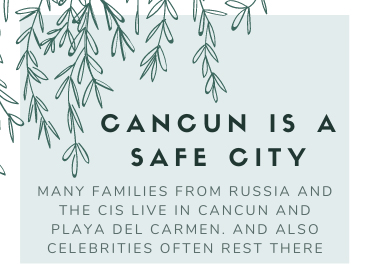
Modern clinics
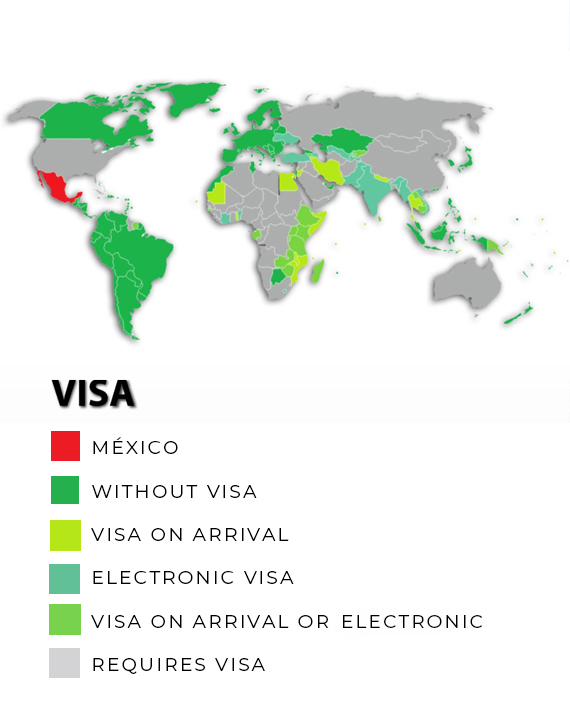
Benefits of mexican citizenship
Dual citizenship is an incredible privilege to have. Not only can you live abroad, but you can use your second passport to access more countries visa-free. More options for where your child can live, work, invest and retire when grown up. A passport from Mexico lets you travel to 145 countries/territories without a prior visa. Another benefit of dual-citizenship is being able to claim consular protection from both of your nationalities. Having a child in Mexico entitles parents to apply for residency in Mexico. You can acquire properties in Mexico without the limitations that a foreign faces.
Mexican citizenship for your child
And the baby will be able to travel without a visa to 145 countries, including European countries (the entire Schengen area), Japan, Canada, Australia, New Zealand and others. Simplified obtaining of Spanish citizenship - a period of 2 years.
Arrival Preparation We tell you what to take, what documents are needed, introduce you to the laws,show examples of housing at competitive prices.

Introduce you to the doula We meet you at the airport and introduce you to the doula, your childbirth assistant that will support you all the time. She will also be your translator.

We choose the accommodation for you We look in advance selected apartments or select them on the spot. We also help you to conclude a lease agreement.

Cancun City Tour We will show you the main shops, bus routes ATMs and banks. We will give you recommendations of the best spots to visit.

We visit clinics You get to know them,communicate with doctors,choose where and from whom you will give birth.

We will accompany you to your doctor's appointments We will be with you at every visit before and after childbirth. YOU choose the doctor!

You give birth safely The birth takes place with the doctor of your choice or Dole's home. We will support and help you with the translation.

We issue the Mexican citizenship for your baby We process the birth certificate, CURP,Mexican passport and other documents.

Permanent residence for the parents We help you to get the permanent resident card. Ready in a short time!

Transfer to the airport We offer airport pick-up and drop-off service.

What's the price?
Our packages.
- DOCUMENTS ONLY
FOR THOSE WHO ONLY WANT DOCUMENTS
Absolutely all * documents are included in this package: 🔹 Baby certificate (it is possible to get it in 1-2 days at home) 🔹 Apostille and translation of the birth certificate (possibly 3-4 days before receiving at home) 🔹 Registration of a Mexican passport for a baby 🔹 Registration of the passport of the country of the parents for the baby 🔹 Registration of permanent residence for parents (2 people maximum) 🔹 Constant WApp support for any questions (24/7) related to documents * Passports for parents (Mexican citizenship) can be obtained after 2 years. Any state fees are always paid separately. Get for 2800$ Get for 1100$ -->
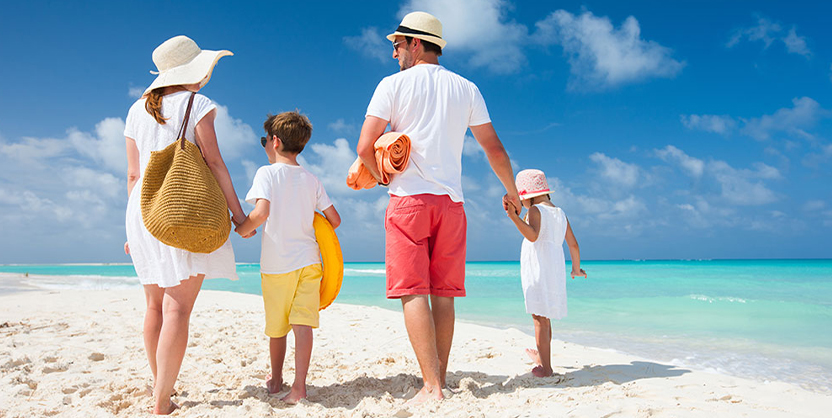
FEEL OUR SUPPORT
🔹 Information support in preparation for arrival 🔹 Meeting at the airport and transfer 🔹 Selection and display of housing, if it was not selected in advance, registration of a lease agreement 🔹 Information support on household issues: mobile communications, the Internet, excursions, shopping, photosets, Spanish language courses, clothes and goods for the baby 🔹 Selection of a doctor and a hospital, depending on the conditions of your pregnancy 🔹 Accompanying consultations and childbirth 🔹 24/7 WApp support for any questions related to the subject of the contract 🔹 The constant presence of a qualified doula interpreter in the hospital during childbirth, from the moment of arrival at the hospital until the receipt of all documents for discharge with the newborn 🔹 Post-natal counseling 🔹 Documents for the baby Get for 4400$
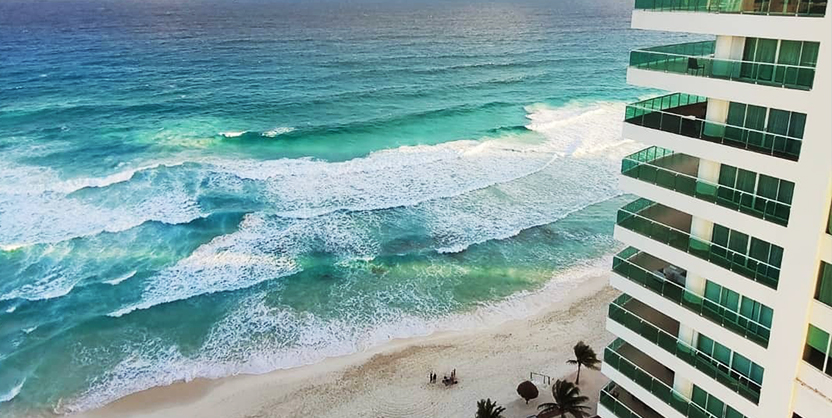
EVERYTHING YOU NEED, NOTHING MORE
* The minimum stay in Mexico for processing all documents for the baby is 1 month after the birth of the child. Documents for the baby are made with acceleration in 2-3 weeks.
* The minimum stay in Mexico for processing all documents for the baby, his parents and older children is 1 month after the birth of the child. Documents for the baby are made with acceleration in 2-3 weeks.

TREAT YOURSELF, YOU DESERVE IT
If you are used to VIP-service and individual approach, then your choice is the "Premium" package
🔹 Chauffeur services and escort in a private car when choosing a clinic and for all consultations to a gynecologist 🔹 Beauty salon services (manicure and pedicure - once every 3-6 weeks, haircut and styling - once every 5-6 weeks for 3 months) 🔹 Pilates or yoga subscription for pregnant women from the 30th week of pregnancy until the baby is born 🔹 Individual family excursion for 1 day 🔹 Mini-documentary about your stay in Cancun 🔹 Spa service for preparation for childbirth (depilation) 🔹 Spanish language courses for 1 family member (1 month) 🔹 Family photo session before childbirth (work not by the clock, but until the result) 🔹 Necessaries for the baby for 3 months: a stroller, car seat, crib, toys 🔹 Tamis for a newborn - screening for more than 60 possible genetic pathologies (mandatory analysis for a newborn) 🔹 Acceleration processing for some documents for a Mexican baby 🔹 Photoshoot of the childbirth at the hospital 🔹 Newborn photoshoot with family 🔹 Ritual of labor closure 🔹 Accompanying a maternity support consultant 🔹 Development of a course on postpartum recovery "Healthy mom" 🔹 Massage course for the pregnant women 🔹 Preparation course for the childbirth and postpartum period (You can choose 7 of 20, please ask us the full list of services) Get for 9200$

Choose your plan
Please reserve your table at least 1 day in advance.
Best atmosphere
PizzaHouse is the place of the best pizza and high-quality service.
Ben Smith, Founder
Selected Pizzas

Margherita Pizza

Mushroom Pizza

Hawaiian Pizza

Pesto Pizza
Happy clients, "the doula took my hand, and it calmed me so much that i didn't even feel pain and after giving birth,it is not pleasant to run around with documents everywhere. i could not leave the baby for a long a time. the company issued all the documents and my husband was always there for me. in general, it is better to pay, and they deservedly receive their money"., anna and mikhail.
I don’t feel sorry for any money for such support.
"In the last month of your pregnancy, you really don't want to look for an apartment and clinic in a foreign country in the heat, but they bring you, show you options, and it becomes easy to choose. There are many minor questions every day, but if it suddenly turns bad, where do you go? Right now, the woman's hormones are naughty, you want to go home, the situation is unusual ... I can't imagine how we would figure it out ourselves ...... Thank you guys, for your support!"
Maria and alexander.
We are happy to have turned to them, without them it would not have been so easy.
"Initially, there was no talk of childbirth in Mexico, we considered the United States or Europe. We found out about maternity tourism in Mexico by chance ... As a result, we saved almost 50%. We are very happy with everything, the level of medicine is higher than ours. And it is also warm and beautiful ... Well, they helped us a lot with the organization, and the support really works 24 hours."
Zhanna and dmitry.
At first we wanted to give birth in the USA
"The Doula helped us with the choice of a clinic, the doctor and enrolled the older children in school. In general, she reduced all of our work to putting our signature here and there. As a result, we now have a Mexican daughter and a residence permit in Mexico for the whole family. We enjoy the sea, learn Spanish and raise children in the wonderful city of Cancun."
Yana and eugene.
Mexico for me is the land of dreams
"You are now like family to us. ALEGRIA amazed me with its instant response and care. From the first moment, from any fucking piece of paper to the choice of doctors, everything fell on the doula. We not only gave birth without nerves, but also became real Mexicans, thanks to your prompt work with lawyers. We recommend you from the bottom of our hearts, from our entire family!"
Victoria and dmitry.
Guys, a direct bow to you!

We organize a photo session for a pregnant mother and after childbirth with a baby.

Shopping! Stuff for mom baby stuff, souvenirs and other purchases.

- Looking for Spanish courses? - No es un problema! Let's pick it up!

We will help you buy / sell a car, or rent it

We will show you how to buy / sell a house and invest profitably in real estate
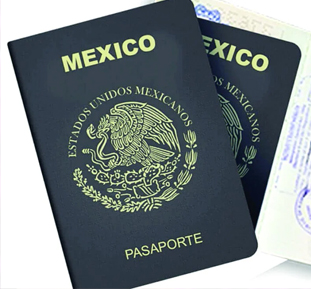
We help parents to obtain Mexican citizenship
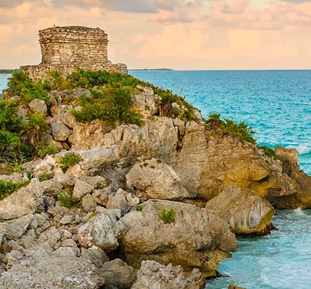
A different flavor, a new adventure, a spot waiting to enchant you!

Let's put together your personalized service package

Get in Touch
- Expat guide
- North America
- Health care
- Pregnancy in Mexico
Pregnancy [DESTINATIONCOMPLET]

Are you already living in Mexico or thinking about relocating and planning on extending your family? This article will explain everything you need to know in case you are (getting) pregnant while living in Mexico.
General information about having a child in Mexico
Birth and pregnancy are already difficult for new moms, but it's even more challenging when you're overseas without a support system. They have to consider so many factors, from medical to legal aspects. The stress and confusion of accessing maternity care may increase for expat women relocating in the middle of their pregnancy or finding themselves here while receiving the news. This article is a helpful starting point if you are pregnant and currently in Mexico or are planning to get pregnant at some point in the future.
Cultural differences
Adapting to different cultural practices can be challenging, especially being a new mother. According to Mexican culture , a new mom should stay home for at least 40 days after giving birth. Expect to get some looks when you go out with your baby early after birth. Nevertheless, Mexicans will be very friendly with you and your newborn.
Furthermore, you must be aware that your child just like you, will be born an expat! Unlike you who probably grew up in your native country, children who spend most of their early years away from their native countries may consider themselves as a third-culture-child. It's something you should be mindful of and assist your child in reconnecting with its heritage.
Read also Traveling to Mexico
Things to think about before giving birth in Mexico
Obviously, there are a number of things you have to consider before actually giving birth to your baby in Mexico . We have tried to gather the most critical points to make them easily accessible and understandable for you.
Access to healthcare facilities
Depending on your area, it can be pretty easy to find a suitable doctor and hospital or pretty challenging. Bigger cities usually have a decent healthcare system and easy access to hospitals and other facilities.
If you are an expat woman giving birth in Mexico, outside of your native country, you must select to utilize public or private medical facilities. When you have admission to Mexican national insurance through the Instituto Mexicano de Seguro Social, you will be able to use public hospitals. Maternal leave is also part of this social safety net. You'll have to choose a private clinic if you do not have general insurance.
Read also The healthcare system in Mexico
Different hospital types
Whether you choose to give birth at a public or a private hospital might vary depending on your personal situation and your preferences as well.
Take into consideration that public hospitals in Mexico won't likely have the same quality as other western countries. Waiting times can be dauntingly long, and the staff probably will not have an adequate level of English or your mother tongue.
In private facilities, the picture is quite a different one. Excellent technology is paired with a highly trained staff that usually has a professional grasp of the English language.
If you want to avoid the expensive costs of giving birth in a private hospital in Mexico, you can opt for maternity insurance. Just be sure to get it done early in your pregnancy!
Read also Health Insurance in Mexico
Things to consider during your pregnancy in Mexico
Prenatal care.
The most important thing is to find a gynecologist you feel safe and comfortable with. So it might be best to look into someone that speaks your native language or at least English.
There are also many prenatal courses and prenatal yoga options if you do not want to skip your practice.
Important dates in your pregnancy are :
- Week 4-28, where you should pay a monthly visit to get a check-up done.
- After that, until week 36, you should do a prenatal visit every two weeks and in your last weeks before giving birth, once a week.
Different types of births in Mexico
There are three types of births: 1) Homebirth, 2) Hospital birth, and 3) Birthing Centers.
Which type you feel most comfortable with is absolutely up to you. The concepts are very different, and every woman has different needs, so this is an absolutely personal choice.
It also depends on your money situation, as the costs vary greatly.
The most common type is hospital birth, and if everything went well, you could leave the hospital after 24 hours. Still, there is a long tradition of home birthing under the guidance of a midwife in Mexico if you want to experience a more natural style of birth.
Once your baby has arrived in this world
Postnatal care.
One important thing to know is that vaccinations are mandatory for babies in Mexico, and Mexico has one of the most developed immunization programs in Latin America. Every Mexican child must be immunized, and in reality, most Mexican childcare institutions and public schools need a kid's national immunization card before admission.
Read also Childcare and education in Mexico
Birth certificate
Once your baby is born, the clinic completes a Spanish form providing data about the mother. When you are married, you must submit your surname as it is on your birth certificate instead of your spouse's family name. To record the birth in person, you must go to the" Registro Civil" as soon as possible after the birth. You will also have to bring two witnesses to testify. This is free of charge, and you won't have to pay anything. The "Registro Civil" will provide you with an official birth certificate, known as "Acta de Nacimiento." It is always a good idea to request numerous copies because you will need them for many things to come.
Additionally, it is advised to notify your home country's embassy about your child's birth. This is especially important for the following procedure for the passport application. Depending on the laws of your home country, your child can have dual citizenship or not.
Medical insurance during pregnancy
You, like citizens and other residents, can use the IMSS system if you are a legal resident. This does not, however, apply to births in public hospitals. If you choose a private hospital, a more comprehensive expat medical insurance coverage is recommended. You may also add a maternity insurance plan that covers prenatal diagnostics, the mother and child during labor, and the newborn infant for 30 days following delivery.
Good to know:
Mexico allows its citizens to hold another citizenship!
Useful links:
Prenatal Care
Cursos prenatales en CDMX y Toluca | Reina Madre
Pro Bebé
Registro Civil
TRÁMITES DE REGISTRO CIVIL | Secretaría de Relaciones Exteriores | Gobierno | gob.mx
The 30 teammates strong Expat.com squad comes from a plethora of countries.

There are two types of hospitals in Mexico: public and private. Many public hospitals are free, but some can only ...

Both Mexicans and foreign visitors highly regard Mexico's healthcare system. As a result, it attracts a large ...

Being an expat in Mexico, you may be unsure how to handle an emergency, such as an accident or other tragedy. This ...

We can recognize an intrinsic spark of love in the Mexican culture, "la serenata." Remember that ...

Mexico has activities for everyone: from exciting adventure to peaceful relaxation, high culture to rowdy street ...
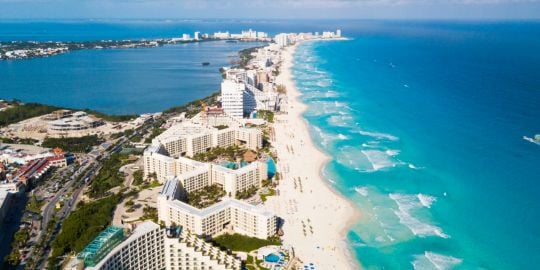
Cancun and surrounding areas are popular destinations for both tourists and expatriates alike. Cancun is the ...
Find more topics on the Mexico forum


What is Birth Tourism?
December 5, 2022

Birth tourism is the practice of traveling to another country for the purpose of giving birth in order to obtain citizenship for the child.
This is often motivated by the desire to provide the child with access to education, healthcare, and other opportunities that are available in the country of birth. Birth tourism is a growing industry, with many pregnant women traveling to countries that have more lenient citizenship laws or that offer other benefits, such as high-quality healthcare or a lower cost of living. Birth tourism is a controversial practice, with some arguing that it exploits citizenship laws and puts a strain on the country’s healthcare system, while others argue that it is a personal choice for families and brings economic benefits to the host country.
Table of Contents
What Are the Benefits of Birth Tourism?
The benefits of birth tourism depend on the perspective of the individuals involved. For the parents, the main benefit of birth tourism is the ability to obtain citizenship for their child , which can provide access to education, healthcare, and other opportunitie s in the host country. This can be especially appealing for parents who live in countries with limited opportunities or who want to provide their child with a better quality of life. The parents can also often get a residency permit and path to citizenship based on their child having been born in a given country.
For the host country, birth tourism can bring economic benefits, as it can generate income from tourism and other related industries. Additionally, birth tourism can diversify the country’s population. Additionally, some argue that it can diversify the country’s population and provide a boost to its economy. However, it is important to note that the benefits of birth tourism are debated and that not everyone agrees on its value.
Why is Birth Tourism Controversial?
Birth tourism is a controversial practice for several reasons. Some argue that it exploits citizenship laws, as many countries have more lenient citizenship requirements for children born on their soil. This can lead to “anchor babies,” who are born in the host country and used as a way for the parents to gain citizenship or other benefits. Additionally, birth tourism can put a strain on the host country’s healthcare system, as it often requires additional resources and services to accommodate the influx of pregnant women. Critics argue that it puts a strain on the country’s healthcare system and other resources, and that it can lead to exploitation of citizenship laws. Critics also argue that birth tourism is unfair to individuals who are unable to travel and must follow the regular citizenship application process.
What is an Anchor Baby?
An anchor baby, also known as a “birthright citizen,” is a term used to refer to a child who is born in a country to parents who are not citizens of that country. The term “anchor baby” comes from the idea that the child can “anchor” the parents in the country by providing them with citizenship or other legal benefits. This term is often used in the context of birth tourism, where pregnant women travel to another country to give birth in order to obtain citizenship for their child. The term “anchor baby” is controversial, as it is often used in a pejorative manner to describe children born through birth tourism. Many people find the term offensive and argue that it is used to stereotype and dehumanize children and their families.
What is Birthright Citizenship?
Birthright citizenship, also known as jus soli, is the practice of granting citizenship to individuals who are born in a country, regardless of the citizenship status of their parents. This is the most common form of citizenship in the world, and it is guaranteed by the 14th Amendment to the United States Constitution . However, not all countries have birthright citizenship, and some countries have more restrictive citizenship laws that only grant citizenship to individuals who are born to citizen parents or who have a certain level of ancestry in the country. Birthright citizenship is a controversial issue, with some arguing that it provides equal opportunities for children and strengthens the country’s economy, while others argue that it encourages birth tourism and exploitation of citizenship laws.
Until What Month Can You Fly Pregnant?
There is no specific month that pregnant women are not allowed to fly in planes. Most airlines allow pregnant women to fly up until their 36th week of pregnancy for single pregnancies, and up until their 32nd week for multiple pregnancies. However, it is always best to check with the airline before booking a flight, as policies may vary. Additionally, pregnant women should consult with their doctor before flying, especially if they have any complications or if they are at an increased risk for complications.
Which Countries Allow Birthright Citizenship?
The specific rules for granting citizenship at birth vary from country to country. Some countries, such as the United States and Canada, grant citizenship to anyone who is born within the country’s territory, while other countries have more restrictive policies. It is important to note that the concept of birthright citizenship is not recognized in all countries, and some countries do not grant citizenship based on place of birth at all. Luckily for Latin America enthusiasts, nearly every country in Latin America recognizes birthright citizenship. Below is a map of birthright citizenship acceptance in Latin America and the world.

What are the Most Popular Countries for Birth Tourism?
The most popular countries for birth tourism vary depending on the specific criteria being considered. Some of the most popular destinations for birth tourism include the United States, Canada, and Mexico, as these countries have more lenient citizenship laws and provide access to education and other opportunities. Other popular destinations for birth tourism include countries in the Caribbean, such as the Bahamas and Barbados, as well as countries in Asia, such as South Korea and Japan. The popularity of a destination for birth tourism can also be influenced by factors such as the quality of healthcare, the cost of living, and the cultural attractions.
What are the Most Popular Countries for Birth Tourism in Latin America?
In Latin America, the conventional choices we hear most about are Mexico and Brazil . In Mexico, birth tourism is a growing industry, with many pregnant women from other countries, particularly from the United States, traveling to Mexico to give birth. This is often motivated by the desire to obtain Mexican citizenship for the child and residency permits for the parents. In brazil, birth tourism is popular because it allows the parents to become near-instant residents of Brazil with a short (often 1 year) path to becoming Brazilian citizens. Other possible destinations for birth tourism in Latin America include Costa Rica and Panama . Panama is known to have the best hospitals in all of Central America , so you can feel confident that you and your family will be treated well. Pretty much every country in Latin America will work for birthright citizenship for the child. If getting a residency permit for the parents in the host country is important to you, you’ll need to research the specific rules for the country or countries that you are targeting.
- Our packages
- Meeting at the airport and transfer
- Choosing apartments and assistance in concluding a lease agreement
- Assistance with choosing a doctor and signing a contract with the hospital
- Accompanying consultations and childbirth
- Post-natal counselling
- Online support and assistance 24/7
- Full package of documents for the baby
- Choosing apartments and assistance in concluding a lease agreemen
- Online support and assistance
- Permanent residence cards registration for both parents
- Transfer for choosing the hospital and for all the consultations to a gynecologist
- Beauty service (manicure, pedicure, haircut)
- Perinatal fitness for the pregnant women
- Individual family excursion Etc.
- Full package of documents for the baby (birth certificate, apostille, a Mexican passport for a newborn)
- Documents for the both parents (obtaining permanent residence cards)
- Services and prices


What Is Birth Tourism? It’s More Than an Aesthetically Pleasing Trend Mommy Influencers Crave
A mother who gave birth abroad and an immigration attorney break down the social and legal questions.
Social media is introducing a new generation of expectant mothers to the idea of giving birth in a foreign country. The trend raises social and legal complexities that often go unaddressed by influencers.
Aesthetically pleasing viral videos promote “birth tourism” as a way to travel the world and have “freedom of movement.” The hashtag has over 21.4 million views on TikTok . The videos are often met with swift criticism from users on the platform.
“I got called an anchor baby for this,” one person wrote under a TikTok video about birth tourism with 1.2 million views. Others called the video “tone deaf” and “ignorant.”
Immigration Laws and Complexities
For TikTok user Hispana Hippie , who requested to be identified by her online persona, giving birth in a foreign country was more than a fleeting “trend.” She decided to move from the U.S. to Mexico before having her baby. She’s now shared her unique experience and perspective with over 60,000 followers.
In an exclusive interview with The Messenger, Hispana Hippie said she supports giving birth abroad but takes issue with the popularization of birth tourism without noting its historical perception.
“We’re saying, ‘Well, you know what, we can...go to your country and have a baby there. But you can’t come to my country and have a baby here and have the same rights,’” she said.
Birth tourism is based on a principle called jus soli , or the law of the soil, which grants citizenship to all people born in the nation. Many nations grant citizenship this way, including the U.S. Others, follow jus sanguinis , or the law of the blood , meaning people acquire citizenship through their parents or ancestors.
Even though the U.S. follows jus soli, there are limitations on who can come to the nation to give birth. U.S. Immigration Attorney Akua Ohenetwene Aboagye explained the laws and limitations surrounding birth tourism in the U.S. to The Messenger.
“The 14th amendment does give people the right to procure U.S. citizenship once they’re born on U.S. soil,” she said.
While the amendment remains in place, some restrictions have been made.
“In 2020...was when former President Donald Trump was in power, he clarified, and based on this clarification, the laws were updated. And the clarification was that people could no longer obtain B2 visas for the sole purpose of giving birth for U.S. citizenship.”
The Stories Behind the Trend
There are many reasons expectant mothers decide to give birth in a foreign country, including a simplified pathway to citizenship, access to education and job opportunities, and the ability to create a better socioeconomic future for themselves and their children.
Hispana Hippie said her decision stemmed from dissatisfaction with prenatal care in the U.S.
“I was fully prepared to have a baby in the U.S., but I was preparing myself to have to fight for my rights because you see a lot of that as a black woman in America,” she said. “You know that they’re not going to listen to you, they’re not going to take you seriously, they’re not going to take your pain seriously. And so you have to make sure you voice your opinions and fight for your rights.”
She said she found a doctor she felt comfortable with and saw her throughout the pregnancy. At her 30-week appointment, a different doctor took care of her. After seeing yet another doctor at the next appointment, Hispana Hippie began to ask questions.
“Jokingly, I said, ‘Are you guys preparing me to not have my doctor do my birth because I haven’t seen her [at] my last two appointments,’” she said. “And they said, ‘Oh yeah, you kind of just get whatever doctor you get whenever you give birth.’ And I said ‘I was expecting that the doctor I chose is the doctor that’s going to be taking care of me for my birth.’ But that wasn’t the case.”
Hispana Hippie later found out that her doctor had left the practice. She said she felt “insecure” and began considering having her baby in a foreign country, where she would not be viewed as a minority.
“I’m Dominican...so I was looking at countries where I was going to feel more at home, and I would be surrounded by people who looked like me and talked like me.”
She said Mexico “felt the best,” and she had an “amazing experience.” She is now raising her child in Mexico, where she can expose them to a new language and culture.
“I think it’s probably one of the best and most positive things I could have done for my child,” she said.
How to Participate in the Trend (Safely)
Hispana Hippie said she hopes that the popularization of birth tourism can change perceptions of immigration in the U.S.
“We should be welcoming,” she said. “We just need to fix our immigration system so that we don’t have folks who are left out and who are not welcome just because we’re America.”
While some wish to give birth abroad with pure intentions, Aboagye said the restrictions in place are necessary to protect U.S. citizens from bad actors.
“They are treating U.S. citizenship like a commodity, like something that can be bought,” Aboagye said. “The U.S. government does not like that because they want to make sure it maintains its integrity. It’s not something that you can just purchase off of the market.”
She explained that an entire birth tourism industry intends to appeal to mothers in foreign countries. The agencies, which exist both in the U.S. and abroad, charge large sums of money to help people illegally give birth in the U.S.
“They provide fictitious bank statements, they coach people how to lie at their immigration interviews,” she said. “They just show them how to just pretty much avoid following the rules so that they can get what they are looking for, which is ultimately U.S. citizenship for their children.”
People who disregard immigration laws can face hefty consequences, according to Aboagye.
“Once you try to sidestep these rules, then you will get a bad history because it’s going to be noted on your immigration record, so you are just going to be pretty much barred from entering the U.S.,” Aboagye said.
That’s why she encourages everyone to become familiar with the laws surrounding birth tourism — no matter what country they plan to venture to, before jumping on the “trend.”
“I will certainly ask you to consult with an immigration attorney who understands the tourism so that you can review what your options are,” she said.
For more information on how to immigrate to the U.S. legally, visit USA.gov . To learn more about immigration on a global scale, visit VisaGuide.world or Passport Index .


Birth Tourism: Benefits of Giving Birth Abroad & Birthright Citizenships
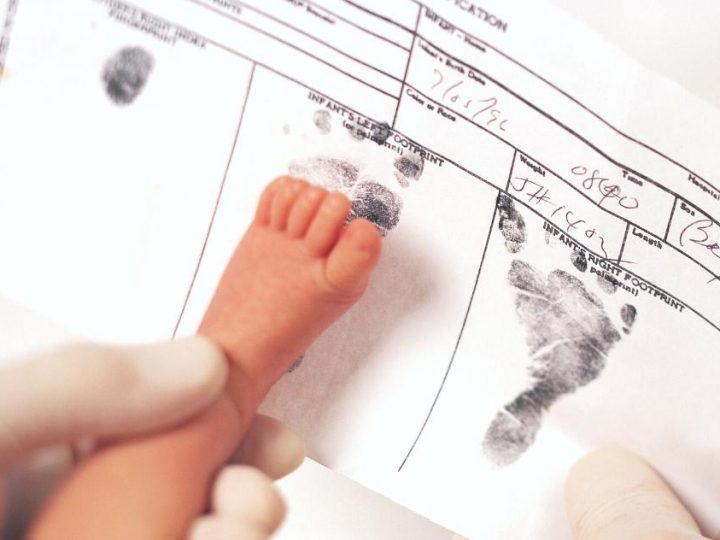
“I guess your kids won’t be US presidents” is what I often hear from people when they find out that neither of my children was born in the US. I usually smile, because surely they won’t be the next president, but instead, they’ll get a lot more benefits in their adult lives than American kids born in the US.
There are a number of ways to get second citizenship and passport: marriage, investment, or years of waiting. However, many forget about an easy one: having a baby in a foreign country.
Parents have a unique opportunity to choose the best country to give birth and give a child another passport. In fact, some countries will even grant the parents (or even grandparents) citizenship as well.
l’ll tell you how and where you can take advantage of birthright citizenship. In fact, I have first-hand experience doing it myself 🙂
Which Countries Have a Birthright?
When it comes to determining a child’s citizenship at birth, countries usually apply one of two rights: jus soli or jus sanguinis .
Jus soli , also known as birthright, grants citizenship merely on the basis of being born “on the soil” of the country in question. There are obviously special circumstances like Armed Forces territories, Embassy grounds, or no man’s lands, but the rule is fairly simple.
Jus sanguinis determines the child’s citizenship based on the parents’ nationality. Not all nationalities can be transmitted to children easily or automatically – for example, if you’re a US citizen but only lived in the US as a child and then left your kids aren’t eligible for US citizenship automatically (see the rules for CRBA ).
The most common example of birthright is obviously the United States. Many people enter the US to give birth to a child who automatically becomes an American citizen as they’re born on US soil.
While the parents aren’t eligible to stay and get residency in the US, the child could return when they’re 18 years old and sponsor the relatives for a green card when they turn 21. Naturally, it involves a lot of money and paperwork and it’s not an easy process when the “anchor child” has no connections in the US, but entirely legally possible.
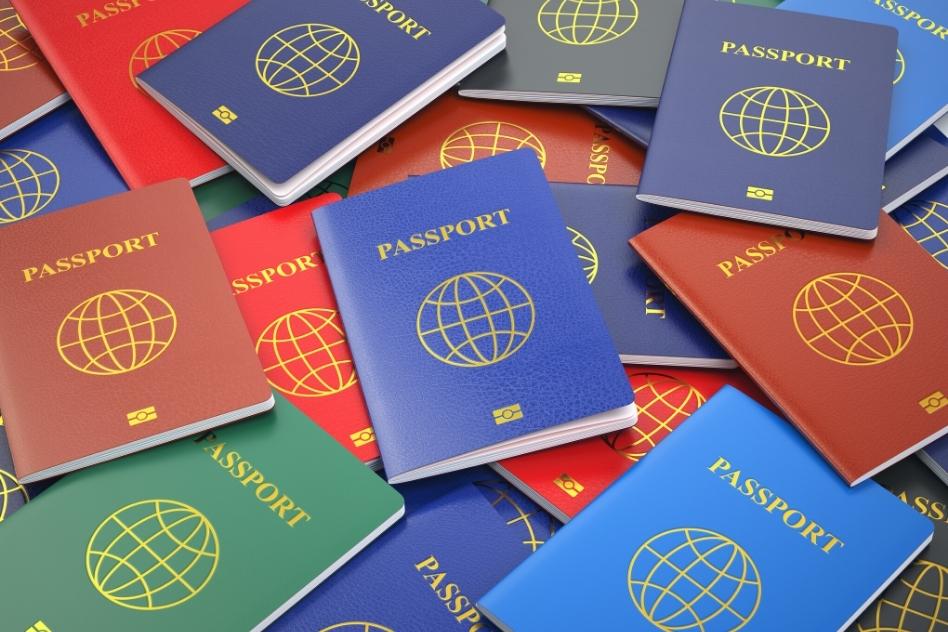
Why Take Advantage of Birthright?
Cost is something that many people think about first, as it’s undeniably cheaper to pay for the hospital birth anywhere outside of the US and get better care. After all… the US has a terrible rate of maternal deaths, especially in some states and people of color.
My personal reasons were that my child can invest in a property in the country without having to lease and jump through hoops and if everything falls apart we all can get citizenships as well. On top of better medical care and lower costs.
Something many Americans or people who push for kids to get American citizenship don’t think about is taxation. Becoming American citizen ties you with the tax system forever, unless you renounce your citizenship for which you need to pay for. It can also screw you when it comes to starting a life elsewhere. How come?
Many non-US banks are wary of doing business with US citizens due to the increased reporting requirements imposed by FATCA and the risk of penalties that apply if those banks fail to comply with the requirements of the Act (and their associated inter-governmental agreements).
In fact, many foreign banks are refusing to do business with US citizens because the risks and costs outweigh the benefits.
It really sucks if you can’t get a home loan (and for example, European mortgage rates can be below 1% which is a huge gain compared to the US) or an investment or even a basic bank account to receive your salary and pay your bills or whatever.
With the advent and proliferation of FATCA, having a non-US place of birth becomes even more valuable. Even if you have a second passport, a US place of birth gives away the fact that you’re a US citizen no matter what, unless you can produce a renunciation certificate.
However, with a non-US place of birth on a non-US passport, there’s nothing advertising one’s US citizenship. If I show up with my kids to Italy tomorrow with my European passport no one would suspect me or my kids of having any ties to the US since they were born in other countries.
You might need to disclose this information, but you can surely fly under the radar that way.
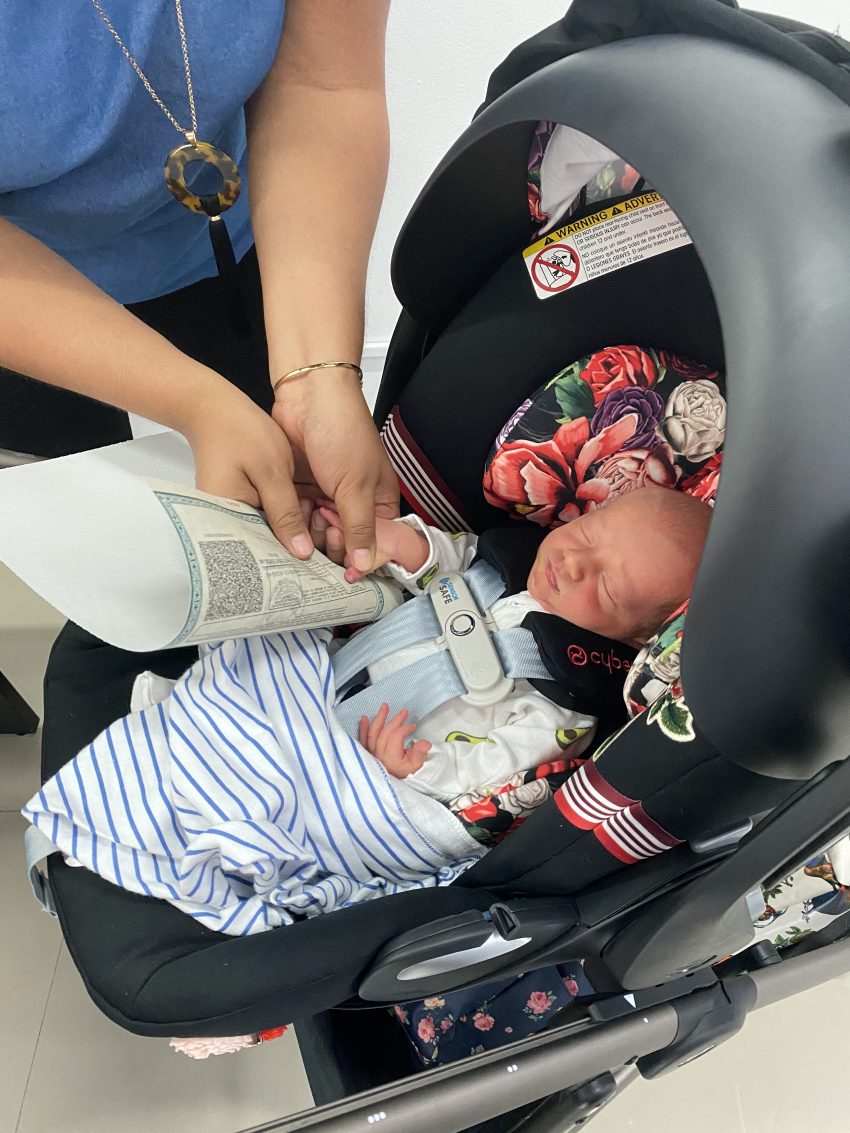
What Countries Offer Birthright Citizenship?
Thinking of having a baby soon? Some countries allow unrestricted jus soli which means parents can just enter on a tourist visa. Others only allow it under special conditions like eg. parents have to live in a country for a year or have a temporary work permit. Full birthright regardless of parents’ status:
France, Luxembourg and Portugal have conditional options only
- United States
- El Salvador
- Antigua and Barbuda
- Saint Kitts and Nevis
- Saint Lucia
- Saint Vincent and the Grenadines
- Trinidad and Tobago
Best countries for birthright citizenship
1. Chile – the country acts on jus soli for anyone. Chile secures 6th place on the best travel document globally.
2. Mexico – the country acts on jus soli for anyone and family members automatically receive permanent residency. With a Mexican passport, one can have access to almost 140 countries.
3. Brazil – provides affordable costs of birth for tourists and strict jus soli. Parents can easily obtain a residency as well. Brazil offers access to approximately 150 countries.
4. Canada – acts on jus soli. The passport gives access to 190 countries visa-free countries.
5. Barbados – Barbadian citizens can travel across 140 countries without a visa with special access to the United Kingdom.
Share this:
Notify me of new posts by email.
Friday 26th of January 2024
Hello Anna, Thank you for these interesting enlightenment on "Jus Soli".
I have always thought about it but never knew what to classify it as.
We had our first baby (Uriel) December 26th, 2022 was unable to get her this second passport by birth due to lack of clarity on how to go about it.
Just three days ago I and my wife had planned to conceive for second baby and in my checklist I added "Birth Tourism and Country" before I stumbled on blog.
Apart from Mexico and Costa Rica, is it possible for parents from Nigeria to get permanent residency rights in Canada as well? Your suggestion and/or advice will be helpful. Thank You.
AnnaEverywhere
Which country was your first baby born in?
And in regards to Canada, no. Your baby would be Canadian, but you won't get a right to stay in the country.
Wednesday 16th of August 2023
What countries give citizenship to the parents as well?
Anna Karsten
Friday 18th of August 2023
Mexico, Brazil and Costa Rica for sure. However, it's not instant, you still need to be there for the indicated amount of time and pass the citizenship and language test.
Saturday 29th of October 2022
Thanks for for this write up. What about Brazil? How safe is it for a mother delivering her baby in Brazil and are parents given a permanent resident card?
What do you mean how safe it is? In terms of hospitals they have excellent medical facilities.
Thursday 17th of February 2022
Please which of these countries you listed give parents permanent residency rights by way of child birth?
Wednesday 23rd of February 2022
@Anna Karsten,
Hi, what are the requirements for parents to get permanent residency by their child being born in Mexico and how long would it take?
Saturday 19th of February 2022
Mexico and Costa Rica for sure.
Thursday 16th of December 2021
My parents both were naturalized American in 1946 but still had Polish citizenship when I was born in the United States in 1945. Is there any path for me to acquire Polish citizenship now without moving there or any other complicated methods?
Poland makes it relatively easy to get citizenship via descent. It's a different process than birthright though, as you've been born in the US.
If your parents lived in Poland before 1920 and maintained their citizenship until you were born then yes, you qualify for citizenship. You need to collect the evidence - eg. their Polish passports, address, any documents from Poland, then send it and the process will take 1-2 years. It's a myth that you need to speak Polish - this rule doesn't apply to citizenship by descent, just to immigrants, and I personally know someone who got his knowing only 3 words in Polish.

Give Birth in Mexico for Citizenship
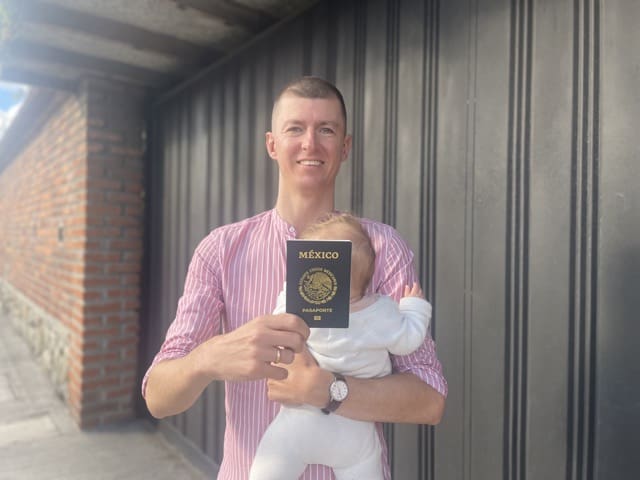
Why give birth in Mexico?
- Amazing, affordable healthcare with English-speaking medical professionals
- Much better customer service than in many “first world” countries
- Affordability of extra services such as midwives, doulas , breastfeeding consultants, etc
- Home births with midwives and doctors are legal in Mexico
- Relaxing environment with great apartments, and the Caribbean nearby to go swimming and relaxing
- Your child automatically becomes a Mexican citizen
- The parents of the child can get permanent residency in Mexico
- Both sets of grandparents of the child can get permanent residency in Mexico
- The siblings of the child can get Mexican permanent residency
- This special permanent residency through “blood” has an accelerated path to citizenship. Permanent Residents must simply stay 18 out of any 24 months in Mexico to qualify.
- Mexican citizens have the same preferential access to the labour market as Canadian citizens. Typically non-US people have to apply for a H1B visa which is very hard to get due to strict quotas, but as a Canadian or Mexican citizen all you need is a job offer. With this job offer you apply for a TN visa (NAFTA professional visa) and can then live and work in the United States. There aren’t any quotes for this visa type. It’s simply procedural. It’s an amazing opportunity to have access to the US labour market later in life. The list of professions and jobs that qualify for this TN visa and NAFTA professional visa can be found here.
Essentially, by having a child in Mexico, you give the whole family a Plan B for life, and the child will have a great second citizenship from day 1.
Sergei runs a company specializing in helping women give birth in Mexico, and deals with all the paperwork linked to citizenship and permanent residency
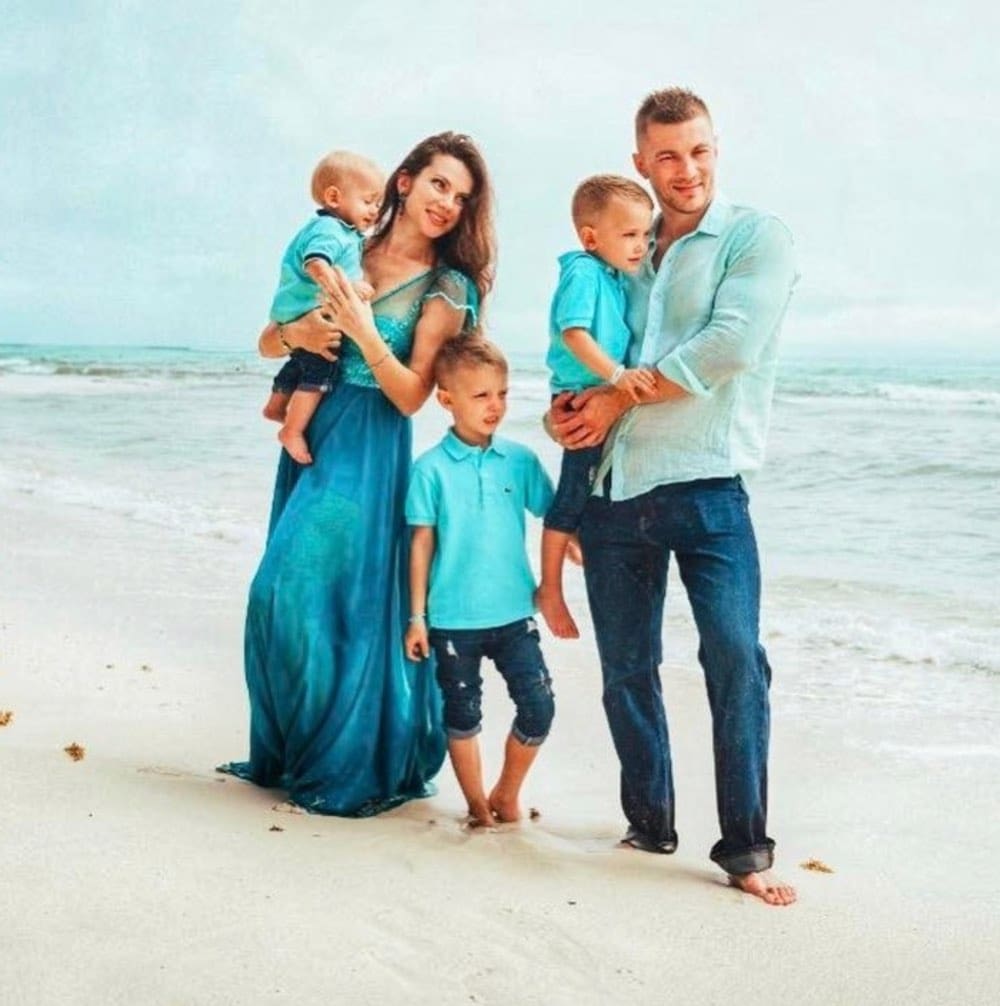
Sergei has been living in Mexico for many years with his family. Two of his three children were born in Mexico, so he and his wife understand the process from A to Z. They have helped hundreds of women and families implement their Child Birth and residency / citizenship plans in Mexico.
You can get in touch with him using the contact form at the bottom of this page .
What can Sergei and his team help you with?
1. all the paperwork related to giving birth in mexico.
Yes, you are entitled to all these documents, but the paperwork is not straightforward. Sergei will help your family from A to Z
- Obtaining the birth certificate
- Obtaining the Mexican passport and ID of the child
- Obtaining permanent residency for the whole family (parents, grandparents, siblings under the age of 18)
For each of the points, Sergei and his team will set up documents, prepay the fees online for you, tell you where & when to go, will give you the documents in hand. All you’ll need to do is stand in line where you are told to stand in line, and wait.
As lovely as Mexico is, it is a very bureaucratic country and things are not always straightforward.
2. Assistance with the birth itself
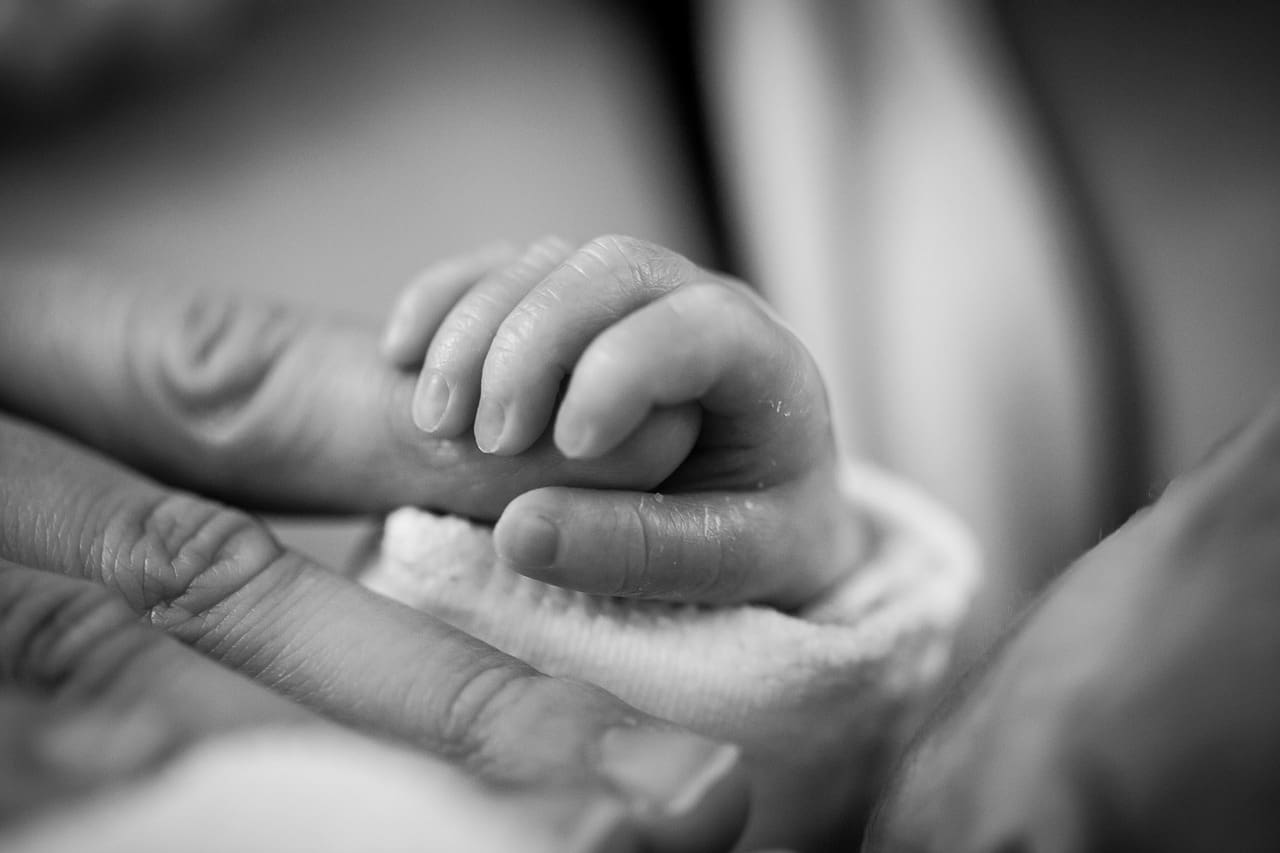
This is the most important part. Sergei and his team have helped hundreds of women go through the child birth experience.
Overall, it is much more affordable than in North America and private facilities in Europe, but the service, competency, and amenities are just as good if not better.
Depending on the experience you are looking for, Sergei and his team will be able to implement it for you.
- C-section? No problem.
- Natural birth? Not an issue.
- Home birth? Of course.
Depending on what you are looking for, Sergei is able to recommend the best doctors and teams to fit your exact wishes.
Also, prior to the birth you can ask for special yoga sessions, pilates, massages, acupuncture, etc
3. Post natal care
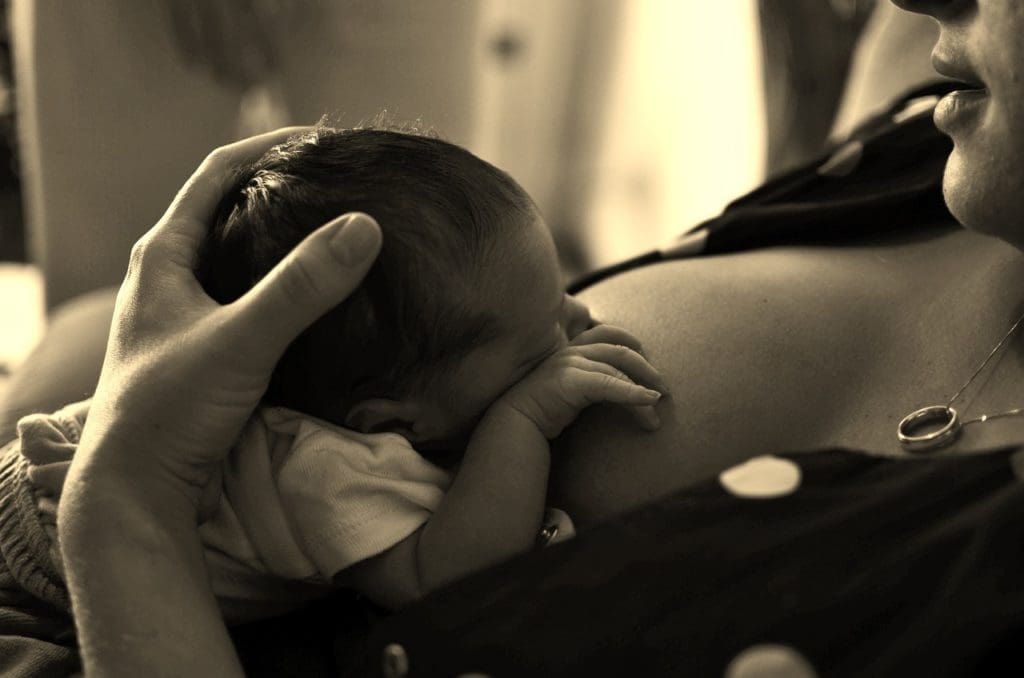
In many cases, the few weeks and months after birth can be even more stressful than the birth itself. Sergei and his team will help you with all the right experts.
- Pediatricians
- Post natal counseling
- Breast feeding experts
4. All the other logistics
- Airport transfers
- Finding an apartment
- Buying or renting a car
- Family and baby photoshoots
- Care packages
- Shopping for the mother and the future baby
- Beauty services such as home pedicures, manicures, hair stylists, etc
- Spanish courses
You are free to choose whatever you want

Sergei has a number of packages, which are customizable. Giving birth is never one size fits all. He and his team will do the utmost to ensure you get the experience you wish for.
Make sure to get in touch with him to get an overview of his packages to give birth in Mexico for citizenship and permanent residency.
or send an email to [email protected]
Services in Mexico:
- How to obtain Residency in Mexico
- My Real Estate Buyer’s Agent in Tulum and Playa del Carmen
- Easy 4 year residency for past tourists in Mexico
- My Favourite Realtor in Puerto Vallarta, Mexico
Articles on Mexico:
- Making a Real Estate Investment in Playa del Carmen – decent diversification
- 6 reasons against a Real Estate Investment in Cancun
- Full Analysis of the Tulum Real Estate Investment Boom
- Investing in Multifamily Housing in Playa del Carmen
- Full Guide to Making a Real Estate Investment in Puerto Vallarta
- What is a Lock Off Condo & Crazy Architecture in Tulum, Mexico
- Puerto Vallarta Investment Case Study with Numbers
- Is a house in Puerto Vallarta a good investment? Case study with capitalization rates
Full transcript of “Give Birth in Mexico for Citizenship”
LADISLAS MAURICE : Hello, everyone. Ladislas Maurice from thewanderinginvestor.com . So today, we’ll be discussing birth tourism in Mexico. So first, I’ll be mentioning why, from an immigration point of view, and then, two, Sergei, who has an agency helping women give birth here in Mexico, will elaborate on the whole process, and all the advantages as well of giving birth here in Mexico. So from an immigration point of view, giving birth in Mexico is an absolute no-brainer. So the child automatically becomes a Mexican citizen . And then you, as the parents of a naturally-born Mexican citizen, are entitled immediately to permanent residency for life, as well as the grandparents and the siblings. So just by having a child here, not only is the child a Mexican citizen, but the whole family has got a Plan B. And permanent residency does not equate tax residency, so it doesn’t automatically trigger tax residency. So it’s a fantastic Plan B in a beautiful country.
Now, Sergei, so that’s for the immigration part. In terms of the actual important part, which is giving birth, which is a big deal, I understand that, you know, as a male, if I were to ask my partner, oh, you know, leave your comfortable country and then come to Mexico for childbirth, it’s a big step.
SERGEI : Yeah. But it’s a big opportunity. Firstly, for the baby, because it’s like a present for his whole life. Mexican passport, it’s the usually second passport, because the first it’s the passport of the parents where they are. And the second it’s from the Mexico, which opens like all the doors from the whole world, it’s more than 150 countries for traveling without the visa , or the Schengen zone, or the Europe, Australia, Canada, Japan, and so on, a lot of, lot of countries.
Secondly, it’s a big opportunity for the whole family, as you already told. PR cards for everyone, for everybody. And after, if they will decide to stay here in Mexico for two years, they can bring the documents to the passport office and to start the process for the whole family with Mexican passports. In two years.
LADISLAS MAURICE : Yeah, that’s a very good point. When you obtain permanent residency essentially through blood, then to obtain citizenship here, you only need to stay 18 months out of a two-year period, to be able to apply for Mexican citizenship. And the process is not that complicated. I know you help people with it.
SERGEI : Yes.
LADISLAS MAURICE : But I mean, you need to learn Spanish. You know, fair enough, it’s not that complicated to learn, it’s actually very pleasant to learn. And you need to pass a test on Mexican culture, which, again, if you’re going to be living here for 18 months out of two years, you might as well learn Spanish and a bit about the country that you’re going to become a citizen of. So really amazing opportunity. Now, in terms of the whole medical aspect, can you explain the whole process, how it works, like the services that your agency offers?
SERGEI : Mexico is a really popular country for the medical tourism. More than 3 million tourists from US, Canada, Great Britain come especially for the medical tourism. And Cancun, it’s the great place. It’s one of the top 10 resort from the whole world. It’s really popular, with a good climate, the best sea, best beaches, and of course, the best medicine. We have different hospitals with international certifications. And we have a huge number of different doctors. All the hospital is totally equipped with all the stuff. And you can easily have a baby here without any problems, and it’s cheaper than in different countries in the whole world.
And you just come here in maybe 32, 34 weeks up to 36, depends by the aircraft company rules. And usually, in one month, you had a baby, and immediately after, we will start all the processes. We have totally support from the very beginning till the end. We help you with the transfer, with the accommodation, with the rent the cars, with consultations, because we have personal assistants. The woman who can help you with doctors, with choosing, with communication, and even she will be with you during the childbirth process inside the hospital, from the beginning to the end, and after we will start the paperwork process.
Firstly, we prepare the birth certificate for the baby. Then we start with the PR for the parents and Mexican passport for the baby. And sometimes, for example, now we had a case, just like one month from the beginning to the end, the family come, had the baby, make all the documents, and it was less than one month. It’s extremely short time, but usually it takes until two and three months, two up to three usually is enough time to prepare everything, to take a rest, to have baby, to prepare all the documents, and that’s all.
LADISLAS MAURICE : And this is a process that you went through essentially with your wife?
SERGEI : Yes, yes.
LADISLAS MAURICE : That’s how you decided to launch this agency because you had your first child here?
SERGEI : Second child.
LADISLAS MAURICE : Your second child?
SERGEI : Yeah. The first child was from other country, but we came six years ago, about six years ago. We went through all the processes, and we now provide this service for all the families who want to make the same steps like us.
LADISLAS MAURICE : And so, for example, not every woman wants to have a birth in a hospital. Do you also offer home birth services, etc.?
SERGEI : Yeah, depends by the situation, because we have different families who say that we want only C-section. No problem, we will find the best doctor for the surgeries. Who want the natural birth, we find the best doctor with humanized experience of the childbirth like natural way. And the family who wants to make childbirth at home, of course, we have different midwives, home midwives, and we organize all the support with the professional doula, not only with our assistants. And during these six years, we had a lot of experience and we know all the doctors, all the midwives, and we can provide during all the steps with pleasure.
LADISLAS MAURICE : So for all the guys out there who find this a very interesting Plan B from a paperwork point of view, what Sergei does, essentially, he takes the whole stress out of the experience for the wife. So she just comes, airport transfer, there’s already a car, there’s a nice apartment. There’s some stunning apartments all over the region, with nice swimming pools. Then you can go, with your wife, you can go swimming in the Caribbean every day before the birth, it’s really good, she can relax. And then she gets the type of birth that she wants with the best doctors in the region. And then the whole paperwork is taken care of. And then the whole support, like you say, with the doula, with the–
SERGEI : Midwife.
LADISLAS MAURICE : with the midwives, etc. So the whole, Sergei is there to essentially take all the stress away from you.
SERGEI : Yeah.
LADISLAS MAURICE : He takes it on, and then you can just focus on the child and the experience of giving birth.
LADISLAS MAURICE : So it’s a very valuable service. Because I understand giving birth abroad is, I mean, giving birth is very stressful. I mean, I don’t know, but from what I can see, it’s quite a stressful experience. And it’s even more so if you go abroad in a new country. So a service such as Sergei’s is absolutely invaluable. So if you’re interested in finding out more about Sergei’s birth tourism services, there is a link below .
LADISLAS MAURICE : All right. Fantastic.
LADISLAS MAURICE : Sergei, thank you very much.
SERGEI : Thank you. Bye.
Explore a World of Opportunities
Join The Wandering Investor's Private List and ensure you never miss out on the latest FREE posts and in-depth investment analysis.
Add [email protected] to your contact list to make sure the articles don't land in Spam! Thank you for subscribing.

What is birth tourism and is it legal?
Disclaimer: Some posts on Tourism Teacher may contain affiliate links. If you appreciate this content, you can show your support by making a purchase through these links or by buying me a coffee . Thank you for your support!
Birth tourism isn’t a term we hear everyday, but it is in actual fact a real thing! Want to learn all about it? Read on…
What is birth tourism?
Anchor babies, future life improvement, two-child policy, right of abode, birth tourism scrutiny in the us, changing citizenship laws, jus sanguinis , birth tourism in north america, birth tourism in hong kong, birth tourism- further reading.
As the name suggests, birth tourism is the action of travelling to a different destination for the purpose of giving birth. There are various reasons as to why pregnant people decide to take this course of action, which I will go into below. It is not a new phenomenon, nor is it something which people are particularly secretive about when they engage in it. It is more common in the US, Canada and Mexico as these countries famously offer birthright citizenship.
It is worth nothing that birth tourism is completely unrelated to the concept of a babymoon, which you can read about here !

Why does birth tourism happen?
So, why does birth tourism exist? One reason is that people may want to give birth where it’s free or at least much cheaper than their home country. They also may feel like other countries are able to provide better (and/or safer) medical care during and immediately after the birth. Childbirth is a terrifying process for many, and people want to feel as confident as possible as they bring a new life into the world.
But the main reason for birth tourism is citizenship purposes. People will travel to a different country to give birth there so that the child has birthright citizenship, also known as jus soli. There are many reasons why someone may want their child to have citizenship in a different country…
An anchor baby is a child born in this country for the purpose of helping their parents obtain permanent residency in this country. Due to the baby having birthright citizenship, it should then be easier for the parents and other family members such as siblings to gain legal and permanent residency. This term is considered to be offensive by some. It often comes into play during immigration arguments, especially in the US.
Canadians use the term ‘passport baby’ in the same way.
Another reason for giving birth to a child in a foreign country, therefore giving them birthright citizenship, is in order to ensure they have access to solid healthcare and a good education in the future. This is to benefit the child themselves.
In the past, people have engaged in birth tourism to get around the Chinese two-child policy – and the one-child policy before it. China now actually has a three-child policy, due to falling birth rates (presumably because of the two-child policy in place). Iran, Singapore and Vietnam have also all had two-child policies in place at one time or another. Birth tourism was a way of circumventing this issue.
This relates specifically to Chinese citizens travelling to Hong Kong to give birth. Doing so gives the child ‘right of abode’ – also known as permanent residence – to live and work in Hong Kong in the future. They would have all the same rights as anyone else born in Hong Kong. This phenomenon has led to tensions between the people of China and the people of Hong Kong, with the latter even taking to the streets to protest the rise in birth tourism.

Is birth tourism illegal?
For the most part, globally, there are no actual laws against travelling to a different country to give birth there. And the reasons which people do it aren’t technically illegal either. This is not to say that it isn’t legally tricky, or frowned upon by the law…
During the Trump administration in 2020, the president imposed new visa rules for pregnant women travelling to the US to give birth there. This did not stop all heavily pregnant women being able to gain visa entry into the US, because they might be travelling to visit an ‘ailing relative’ or for work purposes.
The rule will not apply to foreign travelers coming from any of the 39 mainly European and Asian countries enrolled in the Visa Waiver Program, which allows citizens of those countries to come to the U.S. without a visa for temporary stays. The rule will only apply to applicants for so-called “B” class visas that permit short-term stays for business or pleasure, said AP News.
They went on to say: The practice of traveling to the U.S. to give birth is fundamentally legal, although there are scattered cases of authorities arresting operators of birth tourism agencies for visa fraud or tax evasion. And women are often honest about their intentions when applying for visas and even show signed contracts with doctors and hospitals.
The State Department “does not believe that visiting the United States for the primary purpose of obtaining U.S. citizenship for a child, by giving birth in the United States — an activity commonly referred to as ‘birth tourism’ — is a legitimate activity for pleasure or of a recreational nature,” according to the new rules.
Because of the rise in birth tourism, some countries have changed their citizenship laws. Instead of birthright citizenship being offered to anyone born in the country, the following nations only grant this at birth if at least one parent is a citizen themselves or a legal permanent resident who has lived there for a number of years:
- Australia
- Germany
- New Zealand
- South Africa
- United Kingdom
As opposed to jus soli, the concept of jus sanguinis relates to citizenship being designated by the nationality or ethnicity of one or both parents – despite where the child is born. So for example, a couple who are British and French respectively could give birth to a child in neither of these countries. If the country of birth operated under jus soli, the baby would automatically be a citizen of this country. However, if the birth country uses the process of jus sanguinis then the child would take either British or French citizenship. Originally this would automatically be the same as the father’s – but with equality on the rise, it is now that of either parent.
Popular birth tourism destinations
I have already touched on some of the common places for birth tourism, but below you’ll find some more detail…
As mentioned earlier, the North American countries all offer automatic birthright citizenship, with dual citizenship also allowed. However, this may not always be a positive thing. For example, citizens of the United States are taxed worldwide even if you are not a resident. So you could be born in the US, either through birth tourism or perhaps a premature birth, then leave as a baby and never set foot in the US. You would, in the future, still be liable to pay taxes in the US unless you pay the eye-watering $2350 renunciation fee.
The Center for Immigration Studies say they estimate that there are 33,000 births annually as a result of birth tourism in the US. They also say that the most common countries people travel from for birth tourism are China, Taiwan, Korea, Nigeria, Turkey, Russia , Brazil, and Mexico.
People also travel to Brazil for birth tourism purposes. Children born here, in the largest country in South America , are granted Brazilian citizenship at birth under jus soli – meaning they are Brazilian regardless of their parents’ nationalities. Parents can then apply for ‘residency of the indefinite term’ due to the child having Brazilian citizenship.
International Wealth say: After obtaining residency by submitting your child’s birth certificate and copies of passports, you will be eligible to apply for citizenship after one year.
This fast-track naturalization process is desirable for a parent to obtain a relatively “cheap” second citizenship for you and your family. Your child will benefit from being a citizen of the Mercosur region, allowing them to live, study and work anywhere in the area.
Of course, I touched upon this earlier – but many Chinese parents travel to Hong Kong to give birth so their children can enjoy ‘right of abode’ in the future. This came as a result of the 2003 Individual Visit Scheme which allowed people from Mainland China to visit Hong Kong on an individual basis. Before this, residents could only visit as part of a group tour or on a business visa.
This new rule provided an opportunity for pregnant people to head to Hong Kong and give birth there, thus securing ‘right of abode’ for their offspring. But of course, this resulted in a shortage of resources (hospital beds, midwives, medical equipment and so on) for local residents. They did not take kindly to this, with protests and potential policy changes occurring in more recent years.
If you enjoyed this article I am sure that you will love these too!
- What is special interest tourism and why is it so popular?
- What is alternative tourism and why is it growing so fast?
- The fascinating history of tourism
Liked this article? Click to share!
Birth Tourism: Everything You Need to Know About Giving Birth in a Foreign Country
What is birth tourism & how does it work.

Birth Tourism in Canada
Birth tourism in the us.
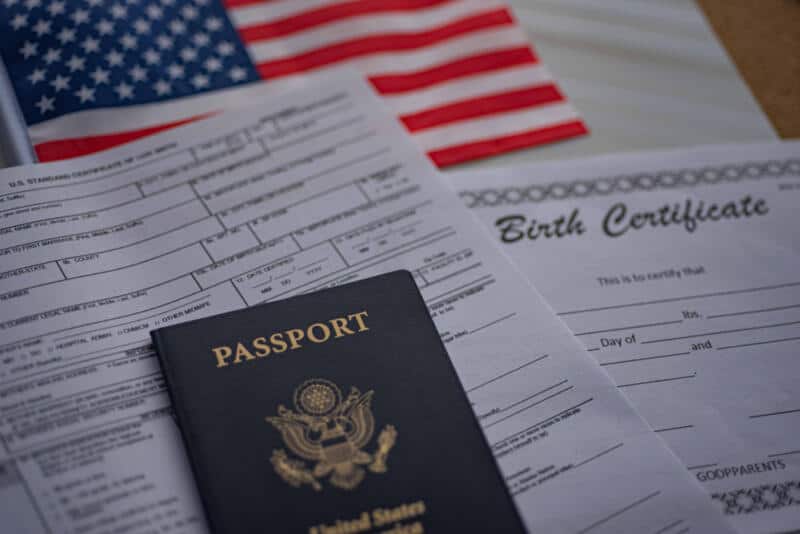
Birth Tourism in Mexico
Other popular birth tourism countries, frequently asked questions about birth tourism, is birth tourism illegal, what are the best places for birth tourism, how much does birth tourism on average cost, which countries have an active birth tourism practice to the us.
Update April 12, 2024
Information for u.s. citizens in the middle east.
- Travel Advisories |
- Contact Us |
- MyTravelGov |
Find U.S. Embassies & Consulates
Travel.state.gov, congressional liaison, special issuance agency, u.s. passports, international travel, intercountry adoption, international parental child abduction, records and authentications, popular links, travel advisories, mytravelgov, stay connected, legal resources, legal information, info for u.s. law enforcement, replace or certify documents.
Before You Go
Learn About Your Destination
While Abroad
Emergencies
Share this page:
Travel Advisory August 22, 2023
Mexico - see state summaries.
Reissued after periodic review with general security updates, and the removal of obsolete COVID-19 page links.
Country Summary: Violent crime – such as homicide, kidnapping, carjacking, and robbery – is widespread and common in Mexico. The U.S. government has limited ability to provide emergency services to U.S. citizens in many areas of Mexico, as travel by U.S. government employees to certain areas is prohibited or restricted. In many states, local emergency services are limited outside the state capital or major cities.
U.S. citizens are advised to adhere to restrictions on U.S. government employee travel. State-specific restrictions are included in the individual state advisories below. U.S. government employees may not travel between cities after dark, may not hail taxis on the street, and must rely on dispatched vehicles, including app-based services like Uber, and regulated taxi stands. U.S. government employees should avoid traveling alone, especially in remote areas. U.S. government employees may not drive from the U.S.-Mexico border to or from the interior parts of Mexico, except daytime travel within Baja California and between Nogales and Hermosillo on Mexican Federal Highway 15D, and between Nuevo Laredo and Monterrey on Highway 85D.
Read the country information page for additional information on travel to Mexico.
Do Not Travel To:
- Colima state due to crime and kidnapping .
- Guerrero state due to crime .
- Michoacan state due to crime and kidnapping .
- Sinaloa state due to crime and kidnapping
- Tamaulipas state due to crime and kidnapping.
- Zacatecas state due to crime and kidnapping .
Reconsider Travel To:
- Baja California state due to crime and kidnapping .
- Chihuahua state due to crime and kidnapping .
- Durango state due to crime .
- Guanajuato state due to crime and kidnapping .
- Jalisco state due to crime and kidnapping .
- Morelos state due to crime .
- Sonora state due to crime and kidnapping .
Exercise Increased Caution When Traveling To:
- Aguascalientes state due to crime .
- Baja California Sur state due to crime .
- Chiapas state due to crime .
- Coahuila state due to crime .
- Hidalgo state due to crime .
- Mexico City due to crime .
- Mexico State due to crime .
- Nayarit state due to crime.
- Nuevo Leon state due to crime and kidnapping .
- Oaxaca state due to crime .
- Puebla state due to crime and kidnapping .
- Queretaro state due to crime .
- Quintana Roo state due to crime .
- San Luis Potosi state due to crime and kidnapping .
- Tabasco state due to crime .
- Tlaxcala state due to crime .
- Veracruz state due to crime .
Exercise Normal Precautions When Traveling To:
- Campeche state
- Yucatan state
Visit our website for Travel to High-Risk Areas .
If you decide to travel to Mexico:
- Keep traveling companions and family back home informed of your travel plans. If separating from your travel group, send a friend your GPS location. If taking a taxi alone, take a photo of the taxi number and/or license plate and text it to a friend.
- Use toll roads when possible and avoid driving alone or at night. In many states, police presence and emergency services are extremely limited outside the state capital or major cities.
- Exercise increased caution when visiting local bars, nightclubs, and casinos.
- Do not display signs of wealth, such as wearing expensive watches or jewelry.
- Be extra vigilant when visiting banks or ATMs.
- Enroll in the Smart Traveler Enrollment Program (STEP) to receive Alerts and make it easier to locate you in an emergency.
- Follow the Department of State on Facebook and Twitter .
- Follow the U.S. Embassy on Facebook and Twitter .
- Review the Country Security Report for Mexico.
- Mariners planning travel to Mexico should check for U.S. maritime advisories and alerts , which include instructions on reporting suspicious activities and attacks to Mexican naval authorities.
- Prepare a contingency plan for emergency situations. Review the Traveler’s Checklist .
- Visit the CDC page for the latest travel health information related to your travel.
Aguascalientes state – Exercise Increased Caution
Exercise increased caution due to crime.
Criminal activity and violence may occur throughout the state.
There are no restrictions on travel for U.S. government employees in Aguascalientes state.
Baja California state – Reconsider Travel
Reconsider travel due to crime and kidnapping.
Transnational criminal organizations compete in the border area to establish narco-trafficking and human smuggling routes. Violent crime and gang activity are common. Travelers should remain on main highways and avoid remote locations. Of particular concern is the high number of homicides in the non-tourist areas of Tijuana. Most homicides appeared to be targeted; however, criminal organization assassinations and territorial disputes can result in bystanders being injured or killed. U.S. citizens and LPRs have been victims of kidnapping.
U.S. government employees must adhere to the noted restrictions:
- Mexicali Valley: U.S. government employees should avoid the Mexicali Valley due to the heightened possibility of violence between rival cartel factions. The boundaries of the restricted area are: to the east, the Baja California/Arizona and Baja California/Sonora borders; to the south, from La Ventana (on Highway 5) due east to the Colorado River; to the west, Highway 5; and to the north, Boulevard Lazaro Cardenas/Highway 92/Highway 1 to Carretera Aeropuerto, from the intersection of Highway 1 and Carretera Aeropuerto due north to the Baja California/California border, and from that point eastward along the Baja California/California border.
- Travelers may use Highways 2 and 2D to transit between Mexicali, Los Algodones, and San Luis Rio Colorado during daylight hours. Travelers may also use Highways 1 and 8 to transit to and from the Mexicali Airport during daylight hours. Travel on Highway 5 is permissible during daylight hours.
There are no other travel restrictions for U.S. government employees in Baja California state. These include high-traffic tourism areas of border and coastal communities, such as Tijuana , Ensenada , and Rosarito .
Baja California Sur state – Exercise Increased Caution
There are no restrictions on travel for U.S. government employees in Baja California Sur state.
Campeche state – Exercise Normal Precautions
Exercise normal precautions.
There are no restrictions on travel for U.S. government employees in Campeche state.
Chiapas state – Exercise Increased Caution
There are no restrictions on travel for U.S. government employees in Chiapas state.
Chihuahua state – Reconsider Travel
Violent crime and gang activity are common. Most homicides are targeted assassinations against members of criminal organizations. Battles for territory between criminal groups have resulted in violent crime in areas frequented by U.S. citizens and U.S. government employees, including restaurants and malls during daylight hours. Bystanders have been injured or killed in shooting incidents. U.S. citizens and LPRs have been victims of kidnapping.
U.S. government employee travel is limited to the following areas with the noted restrictions:
- Ciudad Juarez: U.S. government employees may travel to the area of Ciudad Juarez bounded to the east by Bulevar Independencia; to the south by De los Montes Urales/Avenida Manuel J Clouthier/Carretera de Juárez; to the west by Via Juan Gabriel/Avenida de los Insurgentes/Calle Miguel Ahumada/Francisco Javier Mina/Melchor Ocampo; and to the north by the U.S.-Mexico border. Direct travel to the Ciudad Juarez airport (officially called the Abraham González International Airport) and the factories located along Bulevar Independencia and Las Torres is permitted. Travel to San Jerónimo is permitted only through the United States via the Santa Teresa U.S. Port of Entry; travel via Anapra is prohibited.
U.S. government employees may only travel from Ciudad Juarez to the city of Chihuahua during daylight hours via Federal Highway 45, with stops permitted only at the Guardia Nacional División Caminos station, the Umbral del Milenio overlook area, the border inspection station at KM 35, and the shops and restaurants on Federal Highway 45 in the city of Ahumada.
- U.S. government employees may travel between Ciudad Juarez and Ascension via Highway 2.
- Nuevo Casas Grandes Area (including Nuevo Casas Grandes, Casas Grandes, Mata Ortiz, Colonia Juárez, Colonia LeBaron, Paquimé and San Buenaventura): U.S. government employees may travel to the Nuevo Casas Grandes area during daylight hours via Mexico Federal Highway 2, and subsequently Federal Highway 10, to Nuevo Casas Grandes. Employees are permitted to stay overnight in the cities of Nuevo Casas Grandes and Casas Grandes only.
- City of Chihuahua: U.S. government employees may travel at any time to the area of the city of Chihuahua bounded to the north by Avenida Transformación; to the east by Avenida Tecnológico/Manuel Gómez Morín/Highway 16/Blvd.José Fuentes Mares; to the west by the city boundary; and to the south by Periférico Francisco R. Almada.
- U.S. government employees may travel on Highways 45, 16, and 45D through the city of Chihuahua and to the Chihuahua airport (officially called the General Roberto Fierro Villalobos International Airport).
- U.S. government employees may travel to Santa Eulalia to the east of the city of Chihuahua, as well as to Juan Aldama via Highway 16 to the northeast.
- U.S. government employees may travel south of the city of Chihuahua on Highway 45 to the southern boundary of Parral, including each town directly connected to Highway 45, including Lázaro Cárdenas, Pedro Meoqui, Santa Cruz de Rosales, Delicias, Camargo, Ciudad Jiménez, and Parral itself.
- U.S. government employees may only travel on official business from the city of Chihuahua on Highway 16 to Ciudad Cuauhtémoc bounded by Highway 21 to the north and east, Highway 5 to the west, and Bulevar Jorge Castillo Cabrera to the south.
- Ojinaga: U.S. government employees must travel to Ojinaga via U.S. Highway 67 and enter through the U.S. Port of Entry in Presidio, Texas.
- Palomas: U.S. government employees may travel to Palomas via U.S. highways through the U.S. Port of Entry in Columbus, New Mexico, or via Highway 2 in Mexico.
U.S. government employees may not travel to other areas of Chihuahua, including Copper Canyon .
Coahuila state – Exercise Increased Caution
Violent crime and gang activity occur in parts of Coahuila state.
U.S. government employees must adhere to the following travel restrictions:
- Zaragoza, Morelos, Allende, Nava, Jimenez, Villa Union, Guerrero, and Hidalgo municipalities : U.S. government employees may not travel to these municipalities.
- Piedras Negras and Ciudad Acuña: U.S. government employees must travel directly from the United States and observe a curfew from midnight to 6:00 a.m. in both cities.
There are no other restrictions on travel for U.S. government employees in Coahuila state.
Colima state – Do Not Travel
Do not travel due to crime and kidnapping.
Violent crime and gang activity are widespread. Most homicides are targeted assassinations against members of criminal organizations. Shooting incidents between criminal groups have injured or killed bystanders. U.S. citizens and LPRs have been victims of kidnapping.
Travel for U.S. government employees is limited to the following areas with noted restrictions:
- Manzanillo: U.S. government employee travel is limited to the tourist and port areas of Manzanillo.
- Employees traveling to Manzanillo from Guadalajara must use Federal Toll Road 54D during daylight hours.
U.S. government employees may not travel to other areas of Colima state.
Durango state – Reconsider Travel
Reconsider travel due to crime.
Violent crime and gang activity are common in parts of Durango state.
- West and south of Federal Highway 45: U.S. government employees may not travel to this region of Durango state.
There are no other restrictions on travel for U.S. government employees in Durango state.
Guanajuato state – Reconsider Travel
Gang violence, often associated with the theft of petroleum and natural gas from the state oil company and other suppliers, occurs in Guanajuato, primarily in the south and central areas of the state. Of particular concern is the high number of murders in the southern region of the state associated with cartel-related violence. U.S. citizens and LPRs have been victims of kidnapping.
- Areas south of Federal Highway 45D: U.S. government employees may not travel to the area south of and including Federal Highway 45D, Celaya, Salamanca, and Irapuato.
There are no other restrictions on travel for U.S. government employees in Guanajuato state, which includes tourist areas in: San Miguel de Allende , Guanajuato City , and surrounding areas.
Guerrero state – Do Not Travel
Do not travel due to crime.
Crime and violence are widespread. Armed groups operate independently of the government in many areas of Guerrero. Members of these groups frequently maintain roadblocks and may use violence towards travelers. U.S. citizens and LPRs have been victims of kidnapping in previous years.
Travel for U.S. government employees is limited to the following area with the noted restrictions:
- Taxco: U.S. government employees must use Federal Highway 95D, which passes through Cuernavaca, Morelos, and stay within downtown tourist areas of Taxco. Employees may visit Grutas de Cacahuamilpa National Park during the day with a licensed tour operator.
U.S. government employees may not travel to other areas of the state of Guerrero, including to tourist areas in Acapulco , Zihuatanejo , and Ixtapa .
Hidalgo state – Exercise Increased Caution
There are no restrictions on travel for U.S. government employees in Hidalgo state.
Jalisco state – Reconsider Travel
Violent crime and gang activity are common in parts of Jalisco state. In Guadalajara, territorial battles between criminal groups take place in tourist areas. Shooting incidents between criminal groups have injured or killed innocent bystanders. U.S. citizens and LPRs have been victims of kidnapping.
- Jalisco-Michoacan border and Federal Highway 110: U.S. government employees may not travel to the area between Federal Highway 110 and the Jalisco-Michoacan border, nor travel on Federal Highway 110 between Tuxpan, Jalisco, and the Michoacan border.
- Federal Highway 80: U.S. government employees may not travel on Federal Highway 80 south of Cocula.
There are no other restrictions on travel for U.S government employees in Jalisco state which includes tourist areas in: Guadalajara Metropolitan Area , Puerto Vallarta (including neighboring Riviera Nayarit) , Chapala , and Ajijic .
Mexico City (Ciudad de Mexico) – Exercise Increased Caution
Both violent and non-violent crime occur throughout Mexico City. Use additional caution, particularly at night, outside of the frequented tourist areas where police and security patrol more routinely. Petty crime occurs frequently in both tourist and non-tourist areas.
There are no restrictions on travel for U.S. government employees in Mexico City.
Mexico State (Estado de Mexico) – Exercise Increased Caution
Both violent and non-violent crime occur throughout Mexico State. Use additional caution in areas outside of the frequented tourist areas, although petty crime occurs frequently in tourist areas as well.
There are no restrictions on travel for U.S. government employees in Mexico State.
Michoacan state – Do Not Travel
Do not travel due to crime and kidnapping.
Crime and violence are widespread in Michoacan state. U.S. citizens and LPRs have been victims of kidnapping.
Travel for U.S. government employees is limited to the following areas with the noted restrictions:
- Federal Highway 15D: U.S. government employees may travel on Federal Highway 15D to transit the state between Mexico City and Guadalajara.
- Morelia: U.S. government employees may travel by air and by land using Federal Highways 43 or 48D from Federal Highway 15D.
- Lazaro Cardenas: U.S. government employees must travel by air only and limit activities to the city center or port areas.
U.S. government employees may not travel to other areas of the state of Michoacan, including the portions of the Monarch Butterfly Reserve located in Michoacan.
Morelos state – Reconsider Travel
Violent crime and gang activity are common in parts of Morelos state.
There are no restrictions on travel for U.S. government employees in Morelos state.
Nayarit state – Exercise Increased Caution
Criminal activity and violence may occur throughout Nayarit state.
There are no restrictions on travel for U.S government employees in Nayarit state.
Nuevo Leon state – Exercise Increased Caution
Exercise increased caution due to crime and kidnapping.
Criminal activity and violence may occur throughout the state. U.S. citizens and LPRs have been victims of kidnapping.
There are no restrictions on travel for U.S. government employees in Nuevo Leon state.
Oaxaca state – Exercise Increased Caution
Criminal activity and violence occur throughout the state.
U.S. travelers are reminded that U.S. government employees must adhere to the following travel restrictions:
- Isthmus region: U.S. government employees may not travel to the area of Oaxaca bounded by Federal Highway 185D to the west, Federal Highway 190 to the north, and the Oaxaca-Chiapas border to the east. This includes the cities of Juchitan de Zaragoza, Salina Cruz, and San Blas Atempa.
- Federal Highway 200 northwest of Pinotepa: U.S. government employees may not use Federal Highway 200 between Pinotepa and the Oaxaca-Guerrero border.
There are no restrictions on travel for U.S. government employees to other parts of Oaxaca state, which include tourist areas in: Oaxaca City , Monte Alban , Puerto Escondido, and Huatulco .
Puebla state – Exercise Increased Caution
There are no restrictions on travel for U.S. government employees in Puebla state.
Queretaro state – Exercise Increased Caution
There are no restrictions on travel for U.S. government employees in Queretaro state.
Quintana Roo state – Exercise Increased Caution
Criminal activity and violence may occur in any location, at any time, including in popular tourist destinations. Travelers should maintain a high level of situational awareness, avoid areas where illicit activities occur, and promptly depart from potentially dangerous situations.
While not directed at tourists, shootings between rival gangs have injured innocent bystanders. Additionally, U.S. citizens have been the victims of both non-violent and violent crimes in tourist and non-tourist areas.
There are no restrictions on travel for U.S. government employees in Quintana Roo state. However, personnel are advised to exercise increased situational awareness after dark in downtown areas of Cancun, Tulum, and Playa del Carmen, and to remain in well-lit pedestrian streets and tourist zones.
San Luis Potosi state – Exercise Increased Caution
Criminal activity and violence may occur throughout the state. U.S. citizens and LPRs have been victims of kidnapping.
There are no restrictions on travel for U.S. government employees in San Luis Potosi state.
Sinaloa state – Do Not Travel
Violent crime is widespread. Criminal organizations are based in and operating in Sinaloa. U.S. citizens and LPRs have been victims of kidnapping.
- Mazatlan: U.S. government employees may travel to Mazatlan by air or sea only, are limited to the Zona Dorada and historic town center, and must travel via direct routes between these destinations and the airport and sea terminal.
- Los Mochis and Topolobampo: U.S. government employees may travel to Los Mochis and Topolobampo by air or sea only, are restricted to the city and the port, and must travel via direct routes between these destinations and the airport.
U.S. government employees may not travel to other areas of Sinaloa state.
Sonora state – Reconsider Travel
Sonora is a key location used by the international drug trade and human trafficking networks. Violent crime is widespread. U.S. citizens and LPRs have been victims of kidnapping. Travelers should maintain a heightened level of awareness of their surroundings in all their travels in Sonora. Security incidents may occur in any area of Sonora.
- Travel between Hermosillo and Nogales: U.S. government employees may travel between the U.S. Ports of Entry in Nogales and Hermosillo during daylight hours via Federal Highway 15 only. U.S. government employees may not use ANY taxi services, public buses, nor ride-share applications due to a lack of secure vetting and/or dispatching procedures. Travelers should exercise caution and avoid unnecessary stops as security incidents, including sporadic, armed carjackings, and shootings have been reported along this highway during daylight hours. Travelers should have a full tank of gas and inform friends or family members of their planned travel.
- Nogales: U.S. government employees may not travel in the triangular area north of Avenida Tecnologico, west of Bulevar Luis Donaldo Colosio (Periferico), nor east of Federal Highway 15D (Corredor Fiscal). U.S. government employees also may not travel in the residential and business areas to east of the railroad tracks along Plutarco Elias Calle (HWY 15) and Calle Ruiz Cortino, including the business area around the Morley pedestrian gate port-of-entry. U.S. government employees may not use ANY taxi services, public buses, nor ride-share applications in Nogales due to a lack of secure vetting and/or dispatching procedures and the danger of kidnapping and other violent crimes.
- Puerto Peñasco: U.S. government employees may travel between Puerto Peñasco and the Lukeville-Sonoyta U.S. Port of Entry during daylight hours via Federal Highway 8 only. They may not travel on any other route to Puerto Peñasco. U.S. government employees may not use ANY taxi services, public buses, nor ride-share applications in Puerto Peñasco. due to a lack of secure vetting and/or dispatching procedures and the danger of kidnapping and other violent crimes.
- Triangular region near Mariposa U.S. Port of Entry: U.S. government employees may not travel into or through the triangular region west of the Mariposa U.S. Port of Entry, east of Sonoyta, and north of Altar municipality.
- San Luis Rio Colorado, Cananea, and Agua Prieta : U.S. government employees may travel directly from the nearest U.S. Port of Entry to San Luis Rio Colorado, Cananea (via Douglas Port of Entry), and Agua Prieta, but may not go beyond the city limits. Travel is limited to daylight hours only. Travel between Nogales and Cananea via Imuris is not permitted. U.S. government employees may not use ANY taxi services, public buses, nor ride-share applications in these cities due to a lack of secure vetting and/or dispatching procedures and the danger of kidnapping and other violent crimes.
- Eastern and southern Sonora (including San Carlos Nuevo Guaymas and Alamos): U.S. government employees may not travel to areas of Sonora east of Federal Highway 17, the road between Moctezuma and Sahuaripa, and State Highway 20 between Sahuaripa and the intersection with Federal Highway 16. U.S. government employees may travel to San Carlos Nuevo Guaymas and Alamos; travel to Alamos is only permitted by air and within city limits. U.S. government employees may not travel to areas of Sonora south of Federal Highway 16 and east of Federal Highway 15 (south of Hermosillo), as well as all points south of Guaymas, including Empalme, Guaymas, Obregon, and Navojoa. U.S. government employees may not use ANY taxi services, public buses, nor ride-share applications in these areas due to a lack of secure vetting and/or dispatching procedures and the danger of kidnapping and other violent crimes.
U.S. government employees may travel to other parts of Sonora state in compliance with the above restrictions, including tourist areas in: Hermosillo , Bahia de Kino , and Puerto Penasco .
Tabasco state – Exercise Increased Caution
There are no restrictions on travel for U.S. government employees in Tabasco state.
Tamaulipas state – Do Not Travel
Organized crime activity – including gun battles, murder, armed robbery, carjacking, kidnapping, forced disappearances, extortion, and sexual assault – is common along the northern border and in Ciudad Victoria. Criminal groups target public and private passenger buses, as well as private automobiles traveling through Tamaulipas, often taking passengers and demanding ransom payments.
Heavily armed members of criminal groups often patrol areas of the state and operate with impunity particularly along the border region from Reynosa to Nuevo Laredo. In these areas, local law enforcement has limited capacity to respond to incidents of crime. Law enforcement capacity is greater in the tri-city area of Tampico, Ciudad Madero, and Altamira, which has a lower rate of violent criminal activity compared to the rest of the state.
U.S. citizens and LPRs have been victims of kidnapping.
- Matamoros and Nuevo Laredo: U.S. government employees may only travel within a limited radius around and between the U.S. Consulates in Nuevo Laredo and Matamoros, their homes, the respective U.S. Ports of Entry, and limited downtown sites, subject to an overnight curfew.
- Overland travel in Tamaulipas: U.S. government employees may not travel between cities in Tamaulipas using interior Mexican highways. Travel between Nuevo Laredo and Monterrey is limited to Federal Highway 85D during daylight hours with prior authorization.
U.S. government employees may not travel to other parts of Tamaulipas state.
Tlaxcala state – Exercise Increased Caution
There are no restrictions on travel for U.S. government employees in Tlaxcala state.
Veracruz state – Exercise Increased Caution
Violent crime and gang activity occur with increasing frequency in Veracruz, particularly in the center and south near Cordoba and Coatzacoalcos. While most gang-related violence is targeted, violence perpetrated by criminal organizations can affect bystanders. Impromptu roadblocks requiring payment to pass are common.
There are no restrictions on travel for U.S. government employees in Veracruz state.
Yucatan state – Exercise Normal Precautions
There are no restrictions on travel for U.S. government employees in Yucatan state, which include tourist areas in: Chichen Itza , Merida , Uxmal , and Valladolid .
Zacatecas state – Do Not Travel
Violent crime, extortion, and gang activity are widespread in Zacatecas state. U.S. citizens and LPRs have been victims of kidnapping.
- Zacatecas City : U.S. government employee travel is limited to Zacatecas City proper, and employees may not travel overland to Zacatecas City.
- U.S. government employees may not travel to other areas of Zacatecas state.
Embassy Messages
View Alerts and Messages Archive
Quick Facts
Passport must be valid at time of entry
One page per stamp
Yes, if visiting for more than 180 days
See Travelers’ Health section
Embassies and Consulates
EMERGENCY ASSISTANCE FOR U.S. CITIZENS IN MEXICO From Mexico: 800-681-9374 or 55-8526-2561 From the United States: 1-844-528-6611
U.S. Citizen Services Inquiries: Contact Form
U.S. Embassy Mexico City
Paseo de la Reforma 305 Colonia Cuauhtémoc 06500 Ciudad de México
U.S. Consulate General Ciudad Juarez
Paseo de la Victoria #3650 Fracc. Partido Senecú 32543 Ciudad Juárez, Chihuahua
U.S. Consulate General Guadalajara
Progreso 175 Colonia Americana 44160 Guadalajara, Jalisco
U.S. Consulate General Hermosillo
Monterey, Esqueda 141 El Centenario 83260 Hermosillo, Sonora
U.S. Consulate General Matamoros
Constitución No. 1 Colonia Jardín 87330 Matamoros, Tamaulipas
U.S. Consulate General Merida
Calle 60 No. 338-K x 29 y 31 Colonia Alcalá Martin 97050 Mérida, Yucatán
U.S. Consulate General Monterrey
Avenida Alfonso Reyes 150 Colonia Valle del Poniente 66196 Santa Catarina, Nuevo León
U.S. Consulate General Nogales
Calle San José s/n Fracc. Los Álamos 84065 Nogales, Sonora
U.S. Consulate General Nuevo Laredo
Paseo Colon 1901 Colonia Madero 88260 Nuevo Laredo, Tamaulipas
U.S. Consulate General Tijuana
Paseo de las Culturas s/n Mesa de Otay Delegación Centenario 22425 Tijuana, Baja California
Consular Agencies
Acapulco Hotel Continental Emporio Costera M. Alemán 121 – Office 14 39670 Acapulco, Guerrero Cancun
Blvd. Kukulcan Km 13 ZH Torre La Europea, Despacho 301 77500 Cancún, Quintana Roo
Los Cabos Las Tiendas de Palmilla L-B221, Km. 27.5 Carretera Transpeninsular 23406 San José del Cabo, Baja California Sur
Playa Gaviotas 202, Local 10 Zona Dorada 82110 Mazatlán, Sinaloa
Oaxaca Macedonio Alcalá 407, Office 20 68000 Oaxaca, Oaxaca
Piedras Negras Abasolo 211, Local 3, Centro 26000 Piedras Negras, Coahuila
Playa del Carmen Plaza Progreso, Local 33 Carretera Federal Puerto Juarez-Chetumal, Mz. 293 Lt. 1. 77710 Playa del Carmen, Quintana Roo
Puerto Vallarta
Paradise Plaza, Paseo de los Cocoteros 85 Sur, Local L-7 63732 Nuevo Nayarit, Nayarit
San Miguel de Allende Plaza La Luciérnaga, Libramiento Jose Manuel Zavala 165, Locales 4 y 5 Colonia La Luciérnaga 37745 San Miguel de Allende, Guanajuato
Destination Description
See the State Department’s Fact Sheet on Mexico for more information on U.S.-Mexico relations.
Entry, Exit and Visa Requirements
A valid passport book is required to enter Mexico by air, and those attempting to enter at an airport with a U.S. passport card only may be denied admission.
Review the Mexican government’s most current entry, exit, and visa requirements ( Spanish only ) or visit the Embassy of Mexico in Washington, D.C., for more information.
For travelers entering Mexico by air only, Mexican immigration authorities implemented a process to replace the previous paper Forma Migratoria Multiple or FMM with a Forma Migratoria Multiple Digital or FMMD. The FMMD process is in place at all 66 international airports in Mexico. Upon arrival at an airport, Mexican immigration authorities will determine a traveler’s authorized length of stay and either place a date stamp in the traveler’s passport or direct the traveler through a self-service electronic gate (E-Gate) that will generate a printed receipt with QR code. Air travelers who wish to download a record of their FMMD or find more information on the FMMD process may visit the National Migration Institute’s (INM) website .
Travelers entering Mexico by land should have a valid passport book or card. If you enter Mexico by land and plan to travel beyond the immediate border area (approximately 12 miles or 20 kilometers into Mexico), you must stop at an INM office to obtain an entry permit (Forma Migratoria Multiple or FMM), even if not explicitly directed to do so by Mexican officials. INM may opt to allow tourists entry of up to 180 days without a visa or may limit authorized stays to shorter periods at their discretion; visitors should confirm the specific length of authorized stay written on the entry permit (FMM) or by the stamp in their passport. Mexican immigration authorities could ask you to present both your passport and entry permit if applicable at any point and may detain you while they review your immigration status if you are not carrying your passport and proof of legal status in Mexico, or if you have overstayed your authorized stay. Immigration check points are common in the interior of Mexico, including in popular tourist areas far from the border.
You will also need a temporary vehicle import permit to bring a U.S.-registered vehicle beyond the border zone. These permits are processed through Banjercito and require a deposit that will be refunded once the vehicle leaves Mexico. For more information, visit the Banjercito website ( Spanish only ).
Baja California, Baja California Sur, and Sonora have a “hassle-free” zone that allows cars traveling without an entry permit or car registration within the zone.
Mexican authorities can impound a vehicle that enters the country without a valid U.S. registration, a vehicle driven by a Mexican national who is not resident in the United States, or a vehicle found beyond the border zone without the temporary import permit.
Mexican law permits Mexican immigration authorities to deny foreigners entry into Mexico if they have been charged with or convicted of a serious crime in Mexico or elsewhere.
Travelers bringing in goods beyond their personal effects worth $300.00 or more must declare those goods with Mexican customs (SAT) Mexican customs ( Spanish only ) or risk having them confiscated. This also applies to used goods or clothing, including items for donation. U.S. citizens driving such items into Mexico without declaring them or without sufficient funds to pay duty fees are subject to having their vehicle seized by Mexican customs authorities. For further information about customs regulations, please read our customs information page .
The U.S. Department of State is unaware of any HIV/AIDS entry restrictions for visitors to or foreign residents in Mexico.
A parent or legal guardian departing Mexico with minor children should carry a notarized consent letter from the other parent if traveling separately. INM requires at least one parent to complete a SAM ( Formato de Salida de Menores, Spanish only ) for all Mexican or foreign minors with Temporary Resident, Temporary Student Resident, or Permanent Resident status departing Mexico alone or with a third party. Further information about the prevention of international parental child abduction is available on our website.
Find information on dual nationality , and customs regulations on our websites. Both Mexico and the United States allow dual nationality.
Safety and Security
Travelers are urged to review the Mexico Travel Advisory for information about safety and security concerns affecting the country on a state-by-state basis.
U.S. citizens traveling to and residing in Mexico should not expect public health and safety standards like those in the United States. Even where such standards exist, enforcement varies by location. Travelers should mitigate the risk of illness or injury by taking standard health and safety precautions.
The phone number to report emergencies in Mexico is “911.” Although there may be English-speaking operators available, it is best to seek the assistance of a Spanish speaker to place the call.
Crime: Crime in Mexico occurs at a high rate and can be violent, from random street crime to cartel-related attacks. Over the past year, Mission Mexico has assisted U.S. citizens who were victims of armed robbery, carjacking, extortion, homicide, kidnapping, pick-pocketing, and sexual assault. Increased levels of cartel-related violence have resulted in territorial disputes and targeted killings, injuring or killing innocent bystanders. Travelers who find themselves in an active shooter scenario should flee in the opposite direction, if possible, or drop to the ground, preferably behind a hard barrier.
Drivers on roads and highways may encounter government checkpoints, which often include National Guard or military personnel. State and local police also set up checkpoints in and around cities and along the highways to deter criminal activity and enforce traffic laws. In some parts of Mexico, criminal organizations and other non-governmental actors have been known to erect unauthorized checkpoints and have abducted or threatened violence against those who fail to stop and/or pay a “toll.” When approaching a checkpoint, regardless of whether it is official, cooperate and avoid any actions that may appear suspicious or aggressive.
While Mexican authorities endeavor to safeguard the country’s major resort areas and tourist destinations, those areas have not been immune to the types of violence and crime experienced elsewhere in Mexico. In some areas of Mexico, response time of local police is often slow. In addition, filing police reports can be time consuming. See our Mexico Travel Advisory for more information.
Demonstrations occur frequently. They may take place in response to political or economic issues, on politically significant holidays, and during international events. Protesters in Mexico may block traffic on roads, including major thoroughfares, or take control of toll booths on highways. Travelers who encounter protesters who demand unofficial tolls are generally allowed to pass upon payment. U.S. citizens should avoid participating in demonstrations or other activities that might be deemed political by authorities, as Mexican law prohibits political activities by foreign citizens and such actions may result in detention or deportation.
- Demonstrations can be unpredictable, avoid areas around protests and demonstrations.
- Past demonstrations have turned violent.
- Check local media for updates and traffic advisories.
International Financial Scams: See the Department of State and the FBI pages for information.
Internet romance and financial scams are prevalent in Mexico. Scams are often initiated through Internet postings/profiles or by unsolicited emails and letters. Scammers almost always pose as U.S. citizens who have no one else to turn to for help. Common scams include:
- Romance/Online dating
- Money transfers
- Lucrative sales
- Grandparent/Relative targeting
- Free Trip/Luggage
- Inheritance notices
- Bank overpayments
Mexico’s consumer protection agency, PROFECO (Procuraduría Federal del Consumidor, Spanish only), can sometimes provide assistance (Spanish only) to victims of such scams. In addition, there have been allegations of banking fraud perpetrated by private bankers against U.S. citizens. U.S. citizens who believe they have been victims of fraud can file a police report file a complaint (Spanish only) with the Mexican banking regulatory agency, CONDUSEF (Comision Nacional para la Proteccion y Defensa de los Usuarios de Servicios Financieros, Spanish only), or consult with an attorney.
Victims of Crime: U.S. victims of sexual assault are encouraged to contact the U.S. Embassy or nearest Consulate for assistance. Report emergencies to the local police at 911, report crimes already committed to the Ministerio Publico, and contact the Embassy or Consulate at +52-55-85262561. Remember that local authorities are responsible for investigating and prosecuting crimes.
U.S. citizen victims of crime should contact the local authorities to file a Mexican police report before departing Mexico. In most instances, victims of crime will file reports with the Ministerio Publico (equivalent to the office of public prosecutor or district attorney in the United States) and not with police first responders. U.S. citizens should also inform the U.S. Embassy or nearest consulat e .
See our webpage on help for U.S. victims of crime overseas . We can:
- help you find appropriate medical care,
- assist you in reporting a crime to the police,
- contact relatives or friends with your written consent,
- provide general information regarding the victim’s role during the local investigation and following its conclusion,
- provide a list of local attorneys,
- provide information on victim’s compensation programs in the United States ,
- provide an emergency loan for repatriation to the United States and/or limited medical support in cases of destitution,
- help you find accommodation and arrange flights home,
- replace a stolen or lost passport.
Domestic Violence: U.S. citizen victims of domestic violence are encouraged to contact the U.S. Embassy or nearest consulate for assistance.
Kidnapping: Mexico experiences very high rates of kidnapping. If you believe you or your U.S. citizen or Lawful Permanent Resident (LPR) relative has been kidnapped, please contact the U.S. Embassy or nearest consulate immediately.
Robbery: Mexico experiences robberies, typically in cities, in which abductors force victims to use their debit or credit card to withdraw money from ATMs in exchange for their release. Perpetrators commonly work in cooperation with, or pose as, taxi drivers. To minimize the risk of such robberies:
- Only use a reputable taxi company or a trusted ride-sharing app.
- Book taxis through your hotel or an authorized taxi stand.
Extortion: Extortion schemes are common in Mexico. In a typical scheme known as a virtual kidnapping, criminals convince family members that a relative has been abducted, when, in fact, the person is safe but unreachable. The purported abductors will often use threats to persuade victims to isolate themselves, making communication with family members less likely. Unable to reach their loved ones, family members often consent to paying the “ransom” demand. Criminals use various means to gather information about potential victims, including monitoring social media sites, eavesdropping on conversations, or using information taken from a stolen cell phone. Some of these extortions have been conducted from Mexican prisons. You can reduce the risk of falling victim to this type of extortion through the following:
- Do not discuss travel plans, your room number, or any other personal information within earshot of strangers.
- Do not divulge personal business details to strangers in person or over the phone, especially when using hotel phones.
- If you are threatened on the phone, hang up immediately.
Sexual Assault: Rape and sexual assault are serious problems in some resort areas. Many of these incidents occur at night or during the early morning hours, in hotel rooms, on hotel grounds, or on deserted beaches. In some cases, assailants drug the drinks of victims before assaulting them. Pay attention to your surroundings and to who might have handled your drink.
Credit/Debit Card “Skimming:” There have been instances of fraudulent charges or withdrawals from accounts due to “skimmed” cards. If you choose to use credit or debit cards, you should regularly check your account to ensure there are no unauthorized transactions. Travelers should limit the amount of cash they carry in public, exercise caution when withdrawing cash from ATMs, and avoid ATMs located in isolated or unlit areas.
Alcohol: If you choose to drink alcohol, it is important to do so in moderation and to stop and seek medical attention if you begin to feel ill. There have been reports of individuals falling ill or blacking out after consuming unregulated alcohol. The Mexican Federal Commission for the Protection against Sanitary Risk, COFEPRIS ( Comision Federal para la Proteccion contra Riesgos Sanitarios, Spanish only ), is responsible for inspecting hotels, restaurants, and other establishments for health violations, including reports of unregulated alcohol. Please email COFEPRIS at [email protected] for more information or if you wish to file a report. You can file a report online (Spanish only) via the COFEPRIS website, by calling the COFEPRIS call center at 800 033 50 50 (from Mexico) or +52 (55) 5080-5425 (from the United States), or by scheduling an appointment (Spanish only) to visit a COFEPRIS office.
There have also been instances of criminals drugging drinks to rob or sexually assault victims. Additionally, if you feel you have been the victim of unregulated alcohol or another serious health violation, you should notify the U.S. Embassy or nearest consulate . You may also contact the U.S. Department of State – Bureau of Consular Affairs in Washington, D.C. at 1-888-407-4747 (toll-free in the United States and Canada) or 1-202-501-4444 (from all other countries).
Drug Smuggling: Mexican criminal organizations are engaged in a violent struggle to control trafficking routes. Criminal organizations smuggling drugs into the United States have targeted unsuspecting individuals who regularly cross the border. Frequent border crossers are advised to vary their routes and travel times and to closely monitor their vehicles to avoid being targeted.
Tourism: In major cities and resort areas, the tourism industry is generally well-regulated. Best practices and safety inspections are regularly enforced. Hazardous areas and activities are identified with appropriate signage, and professional staff is typically on hand in support of organized activities. In the event of an injury, appropriate medical treatment is widely available throughout the country. Outside of a major metropolitan center, it may take more time for first responders and medical professionals to stabilize a patient and/or provide life-saving assistance. In smaller towns and areas less commonly frequented by foreign tourists, the tourism industry is unevenly regulated, and safety inspections for equipment and facilities do not commonly occur. Hazardous areas/activities are not always identified with appropriate signage, and staff may not be trained or certified either by the host government or by recognized authorities in the field. In the event of an injury, appropriate medical treatment is typically available only in or near major cities. First responders are generally unable to access areas outside of major cities to provide urgent medical treatment. U.S. citizens are encouraged to purchase medical evacuation insurance .
Since 2016, Mexico has opened seven multilingual Centers for the Care and Protection of Tourists (CAPTA) and Tourist Assistance Centers (CATTAC) in Los Cabos, La Paz, Acapulco, Playa del Carmen, Mazatlan, Ciudad Madero, and Queretaro. These offices have proven helpful assisting U.S. citizen visitors in resolving disputes with merchants and government entities, filing criminal reports, securing needed services, and locating special needs accommodations.
Local Laws & Special Circumstances
Criminal Penalties: You are subject to local laws. If you violate local laws, even unknowingly, you may be expelled, arrested, or imprisoned. Individuals establishing a business or practicing a profession that requires additional permits or licensing should seek information from the competent local authorities prior to practicing or operating a business.
Furthermore, some laws are also prosecutable in the United States, regardless of local law. For examples, see our website on crimes against minors abroad and the Department of Justice website.
Arrest Notification: If you are arrested or detained, ask police or prison officials to notify the U.S. Embassy or nearest consulate immediately. See our webpage for further information.
The Mexican government is required by international law to contact the U.S. Embassy or consulate promptly when a U.S. citizen is arrested if the arrestee so requests. This requirement does not apply to dual nationals.
Firearms and Other Weapons: Weapons laws in Mexico vary by state, but it is generally illegal for travelers to carry weapons of any kind including firearms, knives, daggers, brass knuckles, as well as ammunition (even used shells). Illegal firearms trafficking from the United States to Mexico is a major concern, and the Department of State warns all U.S. citizens against taking any firearm or ammunition into Mexico. If you are caught entering Mexico with any type of weapon, including firearms or ammunitions, you likely will face severe penalties, including prison time. U.S.-issued permits allowing an individual to carry weapons are not valid in Mexico. Visit the Department’s Traveling Abroad with Firearms webpage .
Vessels entering Mexican waters with firearms or ammunition on board must have a permit previously issued by a Mexican embassy or consulate.
Drugs: Drug possession and use, including medical marijuana, is illegal in Mexico and may result in a lengthy jail sentence or fines.
Electronic Cigarettes (Vaping Devices): It is illegal for travelers to bring electronic cigarettes (vaping devices) and all vaping solutions to Mexico. Customs will confiscate vaping devices and solutions and travelers could be fined or arrested. Avoid delays and possible sanctions by not taking these items to Mexico.
Real Estate and Time Shares: U.S. citizens should exercise caution when considering time-share investments or purchasing real estate and be aware of the aggressive tactics used by some sales representatives. Before initiating a real estate purchase or time-share investment, U.S. citizens should consult with a Mexican attorney to learn about important regulations and laws that govern real estate property.
Mountain Climbing and Hiking: The Mexican government has declared the area around the Popocatepetl and the Colima volcanoes off limits. In remote rural areas, there can be limited cell phone coverage and internet connectivity, and it may be difficult for rescue teams and local authorities to reach climbers and hikers in distress.
Potential for Natural Disasters: Mexico is in an active earthquake zone. Tsunamis may occur following significant earthquakes. Please visit our disaster and crisis preparedness webpage for more information. For additional information concerning disasters, see:
- U.S. Embassy Mexico City website
- Civil Protection ( Proteccion Civil, Spanish only ) provides information from the Mexican Government about natural disaster preparedness
- U.S. Federal Emergency Management Agency (FEMA) provides general information about natural disaster preparedness
- U.S. Geological Survey provides updates on recent seismic and volcanic activity
Storm Season: Tropical storms in the Gulf of Mexico or along the Caribbean and Pacific Coast between May and November can produce heavy winds and rain. Please visit our disaster and crisis preparedness webpage for more information.
Spring Break: Millions of U.S. citizens visit Mexican beach resorts each year, especially during “ spring break ” season. The legal drinking age in Mexico is 18. See the “Alcohol” section above to learn more about the risks associated with drinking, as well as reports of illnesses associated with the possible consumption of unregulated alcohol.
Resort Areas and Water Activities: Beaches in Mexico may be dangerous due to strong currents, rip tides, and rogue waves. Warning notices and flags on beaches should be taken seriously. Not all hazardous beaches are clearly marked. If black or red warning flags are up, do not enter the water. Strong currents can lead to dangerous conditions for even the most experienced swimmers. U.S. citizens simply walking along the shore or wading have been swept out to sea by rogue waves, and some citizens have drowned or disappeared at Mexican beaches. Avoid the consumption of alcohol while engaging in water activities and do not swim alone.
Boats used for excursions may not be covered by accident insurance and sometimes lack adequate life jackets, radios, and tools to make repairs. Participation in adventure sports may not be covered by accident insurance and safety protections and regulations for these activities may differ from U.S. standards. Visit our website and the U.S. Centers for Disease Control and Prevention website for more information about adventure travel.
Counterfeit and Pirated Goods: Although counterfeit and pirated goods are prevalent in many countries, they may still be illegal according to local laws. You may also be subject to fines or forced to relinquish the goods if you bring them back to the United States. See the U.S. Department of Justice website for more information.
Faith-Based Travelers: See the following webpages for details:
- Faith-Based Travel Information
- International Religious Freedom Report – see country reports
- Human Rights Report – see country reports
- Hajj Fact Sheet for Travelers
- Best Practices for Volunteering Abroad
LGBTQI+ Travelers: There are no legal restrictions on same-sex sexual relations or on the organization of Lesbian, Gay, Bisexual, Transgender, or Intersex (LGBTQI+) events in Mexico. However, due to sporadic reports of violence targeting LGBTQI+ individuals, U.S. citizens should exercise discretion in identifying themselves publicly as LGBTQI+. See our LGBTQI+ Travel Information page and Section 6 of the Department of State’s Human Rights Report for Mexico for further details.
Travelers with Disabilities: Mexican law prohibits discrimination against persons with physical, sensory, intellectual, or mental disabilities. Social acceptance of persons with disabilities in public is not as prevalent as in the United States. The most common types of accessibility may include accessible facilities, information, and communication/access to services/ease of movement or access. Expect accessibility to be limited in public transportation, lodging, communication/information, and general infrastructure in more rural and remote parts of the country, and more common in public transportation, lodging, communication/information, and general infrastructure in major cities. U.S. citizens with disabilities should consult individual hotels and service providers in advance of travel to ensure they are accessible.
Students: See our Students Abroad page and FBI travel tips .
Women Travelers: There were several reports of sexual assault or domestic violence involving U.S. citizen women over the past year. See our travel tips for Women Travelers .
Excellent health facilities are available in Mexico City and other major cities. Ambulance services are widely available, but training and availability of emergency responders may be below U.S. standards. Injured or seriously ill travelers may prefer to take a taxi to a health provider. Mexican facilities often require payment “up front” before providing medical care, and most hospitals in Mexico do not accept U.S. health insurance. A list of doctors and hospitals is available on the U.S. Embassy or consulate website.
U.S. citizens have lodged complaints against some private hospitals in Cancun, the Riviera Maya, and Los Cabos to include exorbitant prices and inflexible collection measures. Travelers should obtain complete information on billing, pricing, and proposed medical procedures before agreeing to any medical care in these locations. Be aware that some resorts have exclusive agreements with medical providers and ambulance services, which may limit your choices in seeking emergency medical attention. Some hospitals in tourist centers utilize sliding scales, deciding on rates for services based on negotiation and on the patient’s perceived ability to pay. In some instances, providers have been known to determine the limits of a patient’s credit card or insurance, quickly reach that amount in services rendered, and subsequently discharge the patient or transfer them to a public hospital.
Visit the U.S. Centers for Disease Control and Prevention website for information on Medical Tourism.
For emergency services in Mexico, dial 911 . Although there may be English-speaking operators available, it is best to seek the assistance of a Spanish speaker to place the call.
Ambulance services are:
- widely available in major cities but training and availability of emergency responders may be below U.S. standards,
- not present in many remote and rural areas of the country,
- not equipped with state-of-the-art medical equipment.
- Injured or seriously ill travelers may prefer to take a taxi or private vehicle to the nearest major hospital rather than wait for an ambulance.
We do not pay medical bills: Be aware that U.S. Medicare/Medicaid does not apply overseas. Most hospitals and doctors overseas do not accept U.S. health insurance.
Medical Insurance: Make sure your health insurance plan provides coverage overseas. Most care providers overseas only accept cash payments. See our webpage for more information on insurance coverage overseas. Visit the U.S. Centers for Disease Control and Prevention for more information on type of insurance you should consider before you travel overseas.
We strongly recommend supplemental insurance to cover medical evacuation as well.
Always carry your prescription medication in original packaging, along with your doctor’s prescription. Check the Mexican government’s Drug Schedule to ensure the medication is legal in Mexico.
Vaccinations: Be up-to-date on all vaccinations recommended by the U.S. Centers for Disease Control and Prevention.
Further health information :
- World Health Organization
- U.S. Centers for Disease Control and Prevention ( CDC)
Air Quality: Visit AirNow Department of State for information on air quality at U.S. Embassies and Consulates.
The U.S. Embassy maintains a list of doctors and hospitals . We do not endorse or recommend any specific medical provider or clinic.
Medical Tourism and Elective Surgery:
- U.S. citizens have suffered serious complications or died during or after having cosmetic or other elective surgery.
- Medical tourism is a rapidly growing industry. People seeking health care overseas should understand that medical systems operate differently from those in the United States and are not subject to the same rules and regulations. Anyone interested in traveling for medical purposes should consult with their local physician before traveling and visit the U.S. Centers for Disease Control and Prevention website for more information on Medical Tourism.
- We strongly recommend supplemental insurance to cover medical evacuation in the event of unforeseen medical complications.
- Your legal options in case of malpractice are very limited in Mexico. Several foreigners have successfully enlisted the support of PROFECO (Spanish only) in order to resolve disputes over medical services.
- Although Mexico has many elective/cosmetic surgery facilities that are on par with those found in the United States, the quality of care varies widely. If you plan to undergo surgery in Mexico, make sure that emergency medical facilities are available and professionals are accredited and qualified.
Pharmaceuticals
- Exercise caution when purchasing medication overseas. Pharmaceuticals, both over the counter and requiring prescription in the United States, are often readily available for purchase with little controls. Counterfeit medication is common and may prove to be ineffective, the wrong strength, or contain dangerous ingredients. Medication should be purchased in consultation with a medical professional and from reputable establishments.
- The Drug Enforcement Agency reports counterfeit prescription pills are sold by criminals on both sides of the border. These pills are sometimes represented as OxyContin, Percocet, Xanax, and others, and may contain deadly doses of fentanyl. Counterfeit pills are readily advertised on social media and can be purchased at small, non-chain pharmacies in Mexico along the border and in tourist areas. U.S. citizens have become seriously ill or died in Mexico after using synthetic drugs or adulterated prescription pills.
- U.S. Customs and Border Protection and the Food and Drug Administration are responsible for rules governing the transport of medication back to the United States. Medication purchased abroad must meet their requirements to be legally brought back into the United States. Medication should be for personal use and must be approved for usage in the United States. Please visit the U.S. Customs and Border Protection and the Food and Drug Administration websites for more information.
- Visit the Mexican Health Department website (Spanish only) or contact the Embassy of Mexico in Washington, D.C., for more information about obtaining a permit to import medicine into Mexico.
- For a list of controlled substances in Mexico, visit the COFEPRIS website (Spanish only) and the Mexican Drug Schedule (Spanish only). U.S. citizens should carry a copy of their prescription or doctor’s letter, but it is still possible that they may be subject to arrest for arriving in Mexico with substances on these lists. Note that a medicine considered “over the counter” in some U.S. states may be a controlled substance in Mexico. For example, pseudoephedrine, the active ingredient in Sudafed, is considered a controlled substance in Mexico. For more information, contact the Embassy of Mexico in Washington, D.C.
Assisted Reproductive Technology and Surrogacy
- If you are considering traveling to Mexico to have a child through use of assisted reproductive technology (ART) or surrogacy, please see our ART and Surrogacy Abroad page .
- Surrogacy is legal for foreigners in most of Mexico, in some states surrogacy is either not legal or is not governed by regulation.
- If you decide to pursue parenthood in Mexico via assisted reproductive technology (ART) with a gestational mother, be prepared for long and unexpected delays in documenting your child’s citizenship.
- Make sure you understand Mexican law, which can vary from state to state and is ambiguous in its treatment of non-Mexican or same-sex intending parents. Mexican courts, for example, may fail to enforce surrogacy agreements between non-Mexican or same-sex intending parents and gestational mothers.
- Gestational mothers are normally treated as the child’s legal parent with full parental rights in most states. The gestational mother’s name is typically listed on the Mexican state-issued birth certificate. In Mexico City, the intended parents may be listed on the Mexican birth certificate if they can demonstrate a valid surrogacy agreement was in place regarding the child’s birth.
- Be aware that individuals who attempt to circumvent local law risk criminal prosecution. Mexican authorities have made arrests stemming from surrogacy cases.
Carbon Monoxide
- Many hotels and other lodgings are not equipped with carbon monoxide detectors, even if they contain sources of this potentially lethal gas. U.S. citizens have died as a result of carbon monoxide poisoning throughout Mexico. If your lodging is not equipped with a carbon monoxide detector, consider traveling with a portable one.
Water Quality:
- In many areas in Mexico, tap water is not potable. Bottled water and beverages are safe, although you should be aware that many restaurants and hotels serve tap water unless bottled water is specifically requested. Be aware that ice for drinks might be made using tap water.
Altitude:
- Many cities in Mexico, such as Mexico City, are at high altitude, which can lead to altitude illness. Visit the U.S. Centers for Disease Control and Prevention website for more information about Travel to High Altitudes .
Adventure Travel
- Participation in adventure sports and activities may not be covered by accident insurance and safety protections and regulations for these activities may differ from U.S. standards. Visit our website and the U.S. Centers for Disease Control and Prevention website for more information about adventure travel.
General Health
The following diseases are prevalent:
- Typhoid Fever
- Travelers’ Diarrhea
- Chikungunya
- Rocky Mountain Spotted Fever
- Parasitic Infections
- Chronic Respiratory Disease
- Visit the U.S. Centers for Disease Control and Prevention website for more information about Resources for Travelers regarding specific issues in Mexico.
Air Quality
- Air pollution is a significant problem in several major cities in Mexico. Consider the impact seasonal smog and heavy particulate pollution may have on you and consult your doctor before traveling if necessary.
For further health information, go to:
- U.S. Centers for Disease Control and Prevention (CDC)
Private Residential Treatment Facilities:
- These facilities provide care to U.S. citizens throughout Mexico and include child behavior modification facilities, rehabilitation facilities, and assisted living centers.
- There is a wide range in standards for education, safety, health, sanitation, immigration, and residency. Staff licensing may not be strictly enforced or meet the standards of similar facilities in the United States.
- The State Department has received reports of abuse, negligence, or mismanagement at some of these facilities. U.S. citizens should exercise due diligence and do extensive research before selecting a residential treatment facility.
Travel and Transportation
Road Conditions and Safety: Motor vehicle accidents are a leading cause of U.S. citizen deaths in Mexico. If you have an emergency while driving, dial “911.” If you are driving on a toll highway (“ cuota ”) or any other major highway, you may contact the Green Angels ( Spanish only ), a fleet of trucks with bilingual crews, by dialing 078 from any phone in Mexico. Generally, individuals involved in an accident who do not require immediate medical care should contact their insurance providers, who may come to the site to provide an immediate assessment.
Avoid driving on Mexican highways at night. Travel with a charged and functional cell phone capable of making calls in Mexico. Travelers should exercise caution at all times and should use toll (“ cuota ”) roads rather than the less secure free (“ libre ”) roads whenever possible. Do not hitchhike or accept rides from or offer rides to strangers anywhere in Mexico. Travelers encountering police or security checkpoints should comply with instructions.
Road conditions and maintenance across Mexico vary with many road surfaces needing repair. Travel in rural areas poses additional risks to include spotty cell phone coverage and delays in receiving roadside or medical assistance.
Vehicular traffic in Mexico City is subject to restriction Monday through Saturday, according to the license plate number, in order to reduce air pollution. For additional information, refer to the Hoy No Circula website ( Spanish only ) maintained by the Mexico City government. See our Road Safety Page for more information. Also, visit Mexico’s national tourist office website , MexOnline, and Mexico’s customs website Importacion Temporal de Vehiculos ( Spanish only ) for more information regarding travel and transportation.
Traffic Laws: U.S. driver’s licenses are valid in Mexico. Mexican law requires that only owners drive their vehicles or that the owner be inside the vehicle. Failing to abide by this law may lead to impoundment and a fine equal to the value of the vehicle.
Mexican citizens who are not also U.S. citizens or LPRs may not operate U.S.-registered vehicles in Mexico. Mexican insurance is required for all vehicles, including rental vehicles. Drivers involved in accidents, even minor incidents, may be subject to arrest if they are found to be driving without proper insurance, regardless of whether they were at fault. Driving under the influence of alcohol, using a mobile device while driving, and driving through a yellow light are all illegal in Mexico.
If you drive your vehicle into Mexico beyond the immediate border area (approximately 12 miles into Mexico), you must apply for a temporary vehicle import permit with Mexican customs, Banjercito , or at some Mexican consulates in the United States. The permit requires the presentation of a valid passport and a monetary deposit that will be returned to you upon leaving Mexico before the expiration of the permit. Failing to apply for a temporary vehicle import permit may lead to impoundment and a fine equal to the value of the vehicle.
Vehicles crossing into Mexico must have a valid license plate and registration sticker. Mexican authorities will often refuse to admit vehicles with temporary or paper license plates. Vehicles with expired registration or unauthorized plates will likely be confiscated and the operator could be charged with a fine equal to the value of the vehicle.
The Mission Mexico Vehicle Recovery Unit assists with the return of stolen U.S. vehicles recovered by Mexican authorities.
If you have an emergency while driving, dial “911.” If you are driving on a toll highway (“cuota”) or any other major highway, you may contact the Green Angels (Spanish only), a fleet of trucks with bilingual crews, by dialing 078 from any phone in Mexico. Generally, individuals involved in an accident who do not require immediate medical care should contact their insurance providers, who may come to the site to provide an immediate assessment.
Public Transportation/Taxis: Security on public buses varies throughout the country but is considered a relatively safe transportation option in Mexico City and other major tourist centers. Passengers should protect their personal possessions at all times as theft is common. Intercity bus travel should be conducted during daylight hours in preferably first-class buses using toll roads.
Robberies and assaults on passengers in taxis not affiliated with a taxi stand (known as “libre” taxis) are common. Avoid taking any taxi not summoned by telephone or contacted in advance, including “libre” taxis. When in need of a taxi, telephone a radio taxi or “sitio” (regulated taxi stand) and ask the dispatcher for the driver’s name and the taxi’s license plate number. Application-based car services such as Uber and Cabify are available in many Mexican cities, and generally offer another safe alternative to taxis. Official complaints against Uber and other drivers do occur, however, and past disputes between these services and local taxi unions have occasionally turned violent, resulting in injuries to U.S. citizens in some instances.
See our Road Safety page for more information.
Aviation Safety Oversight: The U.S. Federal Aviation Administration (FAA) has assessed the Government of Mexico’s Civil Aviation Authority as not being in compliance with International Civil Aviation Organization (ICAO) aviation safety standards for oversight of Mexico’s air carrier operations. Further information may be found on the FAA safety assessment page .
Maritime Travel: Mariners planning travel to Mexico should also check for U.S. maritime advisories and alerts . Information may also be posted to the U.S. Coast Guard homeport website , and the NGA broadcast warnings .
If you enter by sea, review the Mexican boating permit requirements prior to travel or contact the Embassy of Mexico in Washington, D.C., for more information.
Maritime Safety Oversight: The Mexican maritime industry, including charter fishing and recreational vessels, is subject solely to Mexican safety regulations. Travelers should be aware that Mexican equipment and vessels may not meet U.S. safety standards or be covered by any accident insurance.
For additional travel information
- Enroll in the Smart Traveler Enrollment Program (STEP) to receive security messages and make it easier to locate you in an emergency.
- Call us in Washington, D.C. at 1-888-407-4747 (toll-free in the United States and Canada) or 1-202-501-4444 (from all other countries) from 8:00 a.m. to 8:00 p.m., Eastern Standard Time, Monday through Friday (except U.S. federal holidays).
- See the State Department’s travel website for the Worldwide Caution and Travel Advisories .
- Follow us on Twitter and Facebook .
- See traveling safely abroad for useful travel tips.
Review information about International Parental Child Abduction in Mexico . For additional IPCA-related information, please see the International Child Abduction Prevention and Return Act ( ICAPRA ) report.
Travel Advisory Levels
Assistance for u.s. citizens, learn about your destination, enroll in step.

Subscribe to get up-to-date safety and security information and help us reach you in an emergency abroad.
Recommended Web Browsers: Microsoft Edge or Google Chrome.
Check passport expiration dates carefully for all travelers! Children’s passports are issued for 5 years, adult passports for 10 years.
Afghanistan
Antigua and Barbuda
Bonaire, Sint Eustatius, and Saba
Bosnia and Herzegovina
British Virgin Islands
Burkina Faso
Burma (Myanmar)
Cayman Islands
Central African Republic
Cote d Ivoire
Curaçao
Czech Republic
Democratic Republic of the Congo
Dominican Republic
El Salvador
Equatorial Guinea
Eswatini (Swaziland)
Falkland Islands
France (includes Monaco)
French Guiana
French Polynesia
French West Indies
Guadeloupe, Martinique, Saint Martin, and Saint Barthélemy (French West Indies)
Guinea-Bissau
Isle of Man
Israel, The West Bank and Gaza
Liechtenstein
Marshall Islands
Netherlands
New Caledonia
New Zealand
North Korea (Democratic People's Republic of Korea)
Papua New Guinea
Philippines
Republic of North Macedonia
Republic of the Congo
Saint Kitts and Nevis
Saint Lucia
Saint Vincent and the Grenadines
Sao Tome and Principe
Saudi Arabia
Sierra Leone
Sint Maarten
Solomon Islands
South Africa
South Korea
South Sudan
Switzerland
The Bahamas
Timor-Leste
Trinidad and Tobago
Turkmenistan
Turks and Caicos Islands
United Arab Emirates
United Kingdom
Vatican City (Holy See)
External Link
You are about to leave travel.state.gov for an external website that is not maintained by the U.S. Department of State.
Links to external websites are provided as a convenience and should not be construed as an endorsement by the U.S. Department of State of the views or products contained therein. If you wish to remain on travel.state.gov, click the "cancel" message.
You are about to visit:

- Citizenship by Investment
- Residency by Investment
- Citizenship by Descent
- Virtual Residency
- Citizenship by Investment Programs
- Digital Nomad Visas
- Residency by Investment Programs
- Country Guides
- Memberships
- Argentina Residency
Birth tourism industry: most popular countries
- August 5, 2022
- Citizenship

- Last modified: March 2, 2023
Article Breakdown
What is birthright citizenship.
Birthright citizenship is the practice of granting citizenship to children born in a country , even if their parents are not citizens. The concept is based on the Latin phrase jus soli , which means “right of the soil.”
Birthright citizenship is enshrined in the U.S. Constitution, and it is also practiced in many other places around the world. In most of the Americas, citizenship is automatic for newborns, while in other jurisdictions it may be granted through a formal process. In either case, birthright citizenship ensures that all children have a right to a nationality and the associated protections.
The United States and Canada are the only ones in the “first world” that provide unconditional citizenship to children born in the territory, but a quick search reveals that there are lots of other wonderful places to reside that do as well.
The birth tourism industry
The so called birth tourism industry is a booming business that caters to pregnant women who want to come to the United States or other nations to give birth there, for the primary purpose of obtaining citizenship based on jus soli for their child.
The industry provides everything from travel and accommodation services to guidance on how to obtain a birth certificate and passport for the baby. Birth tourists typically travel to countries with birthright citizenship laws, which grant nationality to babies born on their soil, regardless of the parents’ citizenship status. This is in contrast to most European nations, which only grant citizenship to those born to European citizens.
As a result, these passport seekers see coming to the United States as a way to ensure that their child will have US citizenship and all of the benefits that come with it, including access to education and healthcare. The birth tourism industry has come under scrutiny in recent years, with some critics accusing it of exploiting pregnant women and putting their health at risk. However, there is no evidence that birth tourism is harmful to either mother or child, and the industry continues to grow in popularity.
Is birth tourism a legitimate activity in the US?

Under the modified visa rules for the b nonimmigrant visa regulation, U.S. consular officers overseas will deny any B visa application from an applicant who the consular officer believes is traveling primarily for the intention of giving birth in the United States in order to obtain American citizenship for their newborn.
Visitor visas and tourist visas are not meant for expectant mothers who are coming to the US solely to give birth. However, it is not uncommon for pregnant women to try to enter the country on temporary visas. If they are caught, they can be denied entry and may even be banned from returning to the US in the future. Technically this is seen as visa fraud.
There have been a few high-profile cases of birth tourism involving Chinese citizens in recent years that would pay for a complete package including maternity hotels, which has brought more attention to the issue. In some cases, women have been arrested by officials and deported back to their home countries. Others have been able to give birth in the US without any problems, obtaining U.S. citizenship for their babies.
The issue of birth tourism is a complex one, and there is no easy solution. For now, expectant foreign nationals who are considering traveling to the US for the sole purpose of giving birth should be aware of the risks involved.
What about birth tourism in other countries?

Any child born on that country’s territories becomes a citizen at birth, and the practice is legal in dozens of places. So, which countries automatically issue a passport and citizenship to newborns there, regardless of their parents’ nationality?
Ireland revised its constitution nearly two decades ago to discontinue its habit of becoming the last European country to provide unconditional citizenship to children born to two foreign parents. Malta had already updated theirs as well to end jus soli for births on its soil altogether. Other places, such as Australia , have enacted similar legislation.
However, if you follow present birth tourism options, you can forego dual citizenship and provide your child with numerous citizenships.
Here is the complete list of the finest nations to give birth in if you are looking for birth tourism choices, excluding jurisdictions where the practice is currently prohibited or where nonimmigrant visa regulation makes it practically impossible.
*In order for a child to be born with the Chilean nationality, both parents must have a temporary or permanent residence in Chile at the time of the birth.
**As of September 2020, Portugal is just a few procedures away from expanding its jus soli laws , which award newborns on Portuguese soil birthright citizenship. Children born in Portugal to foreign nationals can currently become Portuguese citizens at birth provided at least one parent has lived in the country for two years or more. The proposed law would shorten that time frame to one year. This is an especially appealing change for Golden Visa investors in Portugal, as they will now be able to give their children Portuguese nationality after only one year of residency once the amended regulation comes into force.
What countries are good options for birth tourism?
This all depends on your current nationalities and which ones you will be able to pass on to your child next to the new citizenship obtained by being born in a birthright country. It also depends on if you need to request an additional visa just to visit the country (in those cases, an advanced pregnancy might be an issue).
Outside of Canada and Chile , none of these citizenships will grant your child visa-free access to the USA. However, since you’re reading this, you might see it as an advantage rather than a disadvantage.
For example, Dominica and St. Kitts and Nevis , charge six-figure fees for their CBI programs and even charge for your children to acquire a passport. Belize used to offer citizenship by investment programs, and is also an appealing birth tourism destination.
Panama , Brazil , Mexico , and Argentina are particularly well-known for their high-quality medical care, featuring world-class facilities that make giving birth not only easy but also significantly cheaper than in any other Western country.
Several nations on this list give the ability to fast track your own citizenship as the parent of a local child. Most other nations will expedite the naturalization of the parents, allowing you to obtain the same citizenship as your child in two to seven years.
Before taking any action, make sure you search for the most up-to-date information from foreign governments, as a number of them have decided to end birthright citizenship, including Australia , New Zealand , Ireland , France , Malta , the Dominican Republic (which resulted in tens of thousands of deportations ), and India. In some places it might be harder to get medical treatment, depending on your insurance coverage.
What are some good passports to obtain via jus soli ?

Some even provide travel benefits to nations where westerners do not have visa-free entry, such as Russia (Brazil and Argentina, including a few others).
BowTiedMara

SovSpot Membership (Monthly)
Subscribe to our newsletter.
We don’t spam, anon.
Notifications about investment visas & platform updates only.
You might also enjoy

How to get El Salvador Citizenship by Descent
If you have Salvadoran ancestry and are looking to obtain El Salvador citizenship by descent, there are a few things you need to know.

St Kitts & Nevis Passport Investment Increases
St Kitts and Nevis Citizenship Program 2023 Amendments Explained St.

Argentina Rentista Visa Program Changes
In June 2023, Argentina changed the Rentista Visa regulations, together
- Citizenship by Descent (36)
- Citizenship by Investment (25)
- Citizenship by Naturalization (6)
- Real Estate (1)
- Digital Nomad Visa (38)
- e-Residency (3)
- Passive Income Visas (3)
- Residency by Investment (38)
- Visas & Travel (4)
Search our blog
Read the latest news:.
- Citizenship by Naturalization
- Digital Nomad Visa
- e-Residency
- Passive Income Visas
- Real Estate
- Visas & Travel

Uruguay Digital Nomad Visa
Florida remains the #1 destination for domestic tourism
Florida also ranks #2 for international tourism.

TALLAHASSEE, Fla. (WWSB) - Governor Ron DeSantis announced that VISIT FLORIDA data shows that Florida has maintained its position as the #1 domestic tourist destination in the United States and remained a top destination for international visitors (ranking #2 in the country).
In 2023, Florida’s market share of domestic tourists increased to 14.8%, up from 13.8% in 2022. This surge in market share represents the largest increase of any state, underscoring Florida’s appeal to travelers from across the country.
“Florida’s world class attractions, hospitality, and unwavering commitment to freedom have solidified our position as the top vacation destination,” said Governor DeSantis. “These figures show that Florida continues to be on the right path, as we have insisted on prioritizing public safety and common-sense leadership.”
While Florida’s domestic market share increased from 2022, other formerly popular destinations saw negative shifts in their shares. California experienced a notable decline, losing 1.2 percentage points, while New York saw a decrease of 0.8 percentage points. With these shifts, Florida now leads the U.S. by a substantial margin, boasting a 2.7 percentage point advantage over California, securing its position as the premier destination for American travelers.
“Florida’s continued ability to attract visitors speaks volumes about the state’s appeal, both domestically and internationally. From our pristine beaches and serene state parks to the thrills of our world-renowned theme parks and vibrant cities, Florida continues to captivate visitors with its unmatched experiences,” said Dana Young, President and CEO of VISIT FLORIDA. “We look forward to continuing to surpass all expectations and welcoming visitors to our beautiful state.”
Florida saw a noticeable uptick in overseas tourism in 2023. As the recovery of international travel continued, Florida garnered 25.2% of the overseas market share of travelers to the U.S.
In March 2024, overseas visitation to Florida surpassed pre-pandemic levels for the first time, with a 1.7% increase compared to March 2019. Notably, visitation from key markets such as the UK, Germany, and Mexico saw significant growth, with UK visitation up by 12%, German visitation up by 28%, and Mexican visitation up 61% compared to the same month in 2019.
Copyright 2024 WWSB. All rights reserved.

Police officer helps deliver baby boy on side of road

First Alert Weather: Hot days ahead

MCSO: Man shoots pregnant woman during road rage incident

Deadly boating incident in Tampa

Man arrested with alleged multiple guns in Sarasota
Latest news.

First Alert Weather: We stay dry and warm

Alliance Française De Sarasota: French culture on the Suncoast

Choral Artists of Sarasota heading to Normandy for D-Day's 80th commemoration

Veterans memorial events at Sarasota National Cemetery

Memorial Day: A time to honor fallen troops ultimate sacrifice

COMMENTS
You have 180 days to register the baby. FOR HOME BIRTH IN MEXICO: If you had or want to have a home birth, you obviously won't have the discharge papers from any hospital. The certified midwife you hire must issue a certificate related to the birth and later the mother and the minor must go to request the certificate.
Puerto Vallarta is a big tourist town, including medical tourism, and many locals speak good English. After the initial pediatrician check, baby Arrow never left my side. As is common in Mexico for a birth with no complications, we left the hospital in less than 24 hours after giving birth. Cost of OB delivery: $2490.74
Registering a birth in Mexico is a relatively straightforward process. Here are the steps: Obtain a birth certificate from the hospital or birthing center where the baby was born. If the birth occurred at home, a midwife or doctor can issue a birth certificate. Go to the local Registro Civil office to register the birth.
Reason no. 1: Financial. We naturally had health insurance in the US and I had most of my prenatal visits with a doctor whom I liked. I had my 20-week ultrasound in Poland, because I was traveling and also because I couldn't get an appointment in the US for some weird reason and just scheduled one there instead for $50.
As each pregnancy is unique, your gynecologist will let you know the recommended number of visits. Generally speaking, healthy pregnancies have the following schedule: Weeks 4 to 28: 1 prenatal visit a month. Weeks 28 to 36: 1 prenatal visit every 2 weeks. Weeks 36 to 40: 1 prenatal visit every week.
Allow yourself the birth without consequences, getting all the documents for the baby and parents on time, with a real certified doula, and be sure that you will be allowed to enter Mexico at the border upon arrival. You will know all the details from our side from the correct filling of the migration card, a package of necessary documents for ...
Birth tourism is the practice of traveling to another country or city for the purpose of giving birth in that country. ... In Mexico, only naturalized citizens can lose their Mexican citizenship again (e.g., by naturalizing in another country). United States
Adapting to different cultural practices can be challenging, especially being a new mother. According to Mexican culture, a new mom should stay home for at least 40 days after giving birth. Expect to get some looks when you go out with your baby early after birth. Nevertheless, Mexicans will be very friendly with you and your newborn.
In Mexico, birth tourism is a growing industry, with many pregnant women from other countries, particularly from the United States, traveling to Mexico to give birth. This is often motivated by the desire to obtain Mexican citizenship for the child and residency permits for the parents.
Obtaining Mexican citizenship for a newborn and permanent residence for the whole family. The timeline for processing documents depends on the queue in public institutions. On average, it takes from 1 to 2 months. We do our best to prepare documents for the child and parents within a month.
The original birth certificate, marriage certificate (if applicable) and proof of identity of both parents is required. Other documents may be required, check with the relevant embassy. Children born to foreign parents in Mexico are entitled to dual citizenship until they are 18. Once they turn 18 they must choose between one of the nationalities.
Hospital fees in Mexico can vary widely but generally are still reasonable in comparison to the U.S. Here are three examples (prices are approximate and as of August 2022) HOSPITAL MEDICA SUR - TLALPAN, MEXICO CITY. Standard hospital natural birth package: 25,000 pesos . OBGYN's salary: 30,000 pesos . OBGYN's assistant's salary: 5,000 pesos
Maternity and childcare leave in Mexico. It takes 1.5 months before giving birth and 1.5 months after giving birth for a total of 3 months. It is now possible to shift prenatal to postnatal. So my wife. Until just before childbirth, I was quite relaxed,
Aesthetically pleasing viral videos promote "birth tourism" as a way to travel the world and have "freedom of movement." ... She decided to move from the U.S. to Mexico before having her ...
With a Mexican passport, one can have access to almost 140 countries. 3. Brazil - provides affordable costs of birth for tourists and strict jus soli. Parents can easily obtain a residency as well. Brazil offers access to approximately 150 countries. 4. Canada - acts on jus soli. The passport gives access to 190 countries visa-free countries.
Childbirth in Mexico. In its early history, Mexico was occupied by a large number of indigenous tribes such as the Mayans and Aztecs. In the 16th century, Spain colonized New Spain and took over the land from the indigenous peoples. [1] Though it is now an independent nation, Mexico retains much of the cultural influence of Spain, including its ...
Giving birth is never one size fits all. He and his team will do the utmost to ensure you get the experience you wish for. Make sure to get in touch with him to get an overview of his packages to give birth in Mexico for citizenship and permanent residency. or send an email to [email protected].
The Center for Immigration Studies say they estimate that there are 33,000 births annually as a result of birth tourism in the US. They also say that the most common countries people travel from for birth tourism are China, Taiwan, Korea, Nigeria, Turkey, Russia, Brazil, and Mexico. Brazil. People also travel to Brazil for birth tourism purposes.
Birth tourism in Mexico is regarded as one of the most profitable industries in the country, with various hospitals and birth clinics offering affordable access to healthcare services, maternity insurance, and parental care options. While Mexican public hospitals are known for language barriers and long waiting times, the private hospital ...
Call us in Washington, D.C. at 1-888-407-4747 (toll-free in the United States and Canada) or 1-202-501-4444 (from all other countries) from 8:00 a.m. to 8:00 p.m., Eastern Standard Time, Monday through Friday (except U.S. federal holidays). See the State Department's travel website for the Worldwide Caution and Travel Advisories.
I sat down with Sergei who has a company specializing in birth tourism in Mexico. By giving birth in Mexico, the parents are entitled to permanent residency ...
When it comes to determining a child's citizenship at birth, countries usually apply one of two rights: jus soli (right of soil) or jus sanguinis (right of blood). Jus soli grants citizenship merely on the basis of being born "on the soil" of the country in question. Jus sanguinis determines the child's citizenship based on the parents ...
For example, Dominica and St. Kitts and Nevis, charge six-figure fees for their CBI programs and even charge for your children to acquire a passport. Belize used to offer citizenship by investment programs, and is also an appealing birth tourism destination. Panama, Brazil, Mexico, and Argentina are particularly well-known for their high ...
Notably, visitation from key markets such as the UK, Germany, and Mexico saw significant growth, with UK visitation up by 12%, German visitation up by 28%, and Mexican visitation up 61% compared ...
The 2024 NM Forward 2.0 series aims to examine external perceptions of New Mexico by its neighboring states and in partnership with the research team at our parent company, American City Business ...